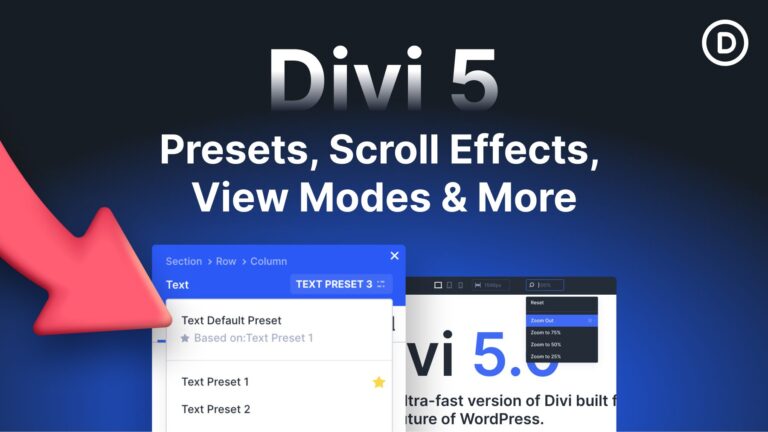Are you excited to launch your business venture to the online world but are struggling to identify the best eCommerce platforms? You may have heard of Shopify and Bigcommerce and want to see which better suits your needs. They are two of the most prominent names in the eCommerce industry. With their widespread recognition, cutting through the marketing noise and determining which platform best suits your business can be challenging. This guide aims to simplify that decision and gives you an in-depth comparison of BigCommerce vs. Shopify.
Bigcommerce vs. Shopify At a Glance
What is Bigcommerce?

BigCommerce is an eCommerce robust commerce platform with a website builder that caters specifically to online stores. Unlike general website builders, this platform offers a wide range of features essential for selling products. These include managing product listings and inventory, integrating secure payment gateways, and providing Search Engine Optimization (SEO) tools to attract customers.
The platform has a user-friendly interface with drag-and-drop tools and pre-designed themes, allowing entrepreneurs with minimal technical knowledge to build a professional online store. This empowers business owners to save time and money on web development so they can focus on growing their sales.
And, unlike most commerce platforms, Bigcommerce works with WordPress.
What is Shopify?

Shopify is a comprehensive eCommerce platform that doubles as a user-friendly website builder. Unlike general website builders, this platform prioritizes the specific needs of online stores. With a drag-and-drop interface and a vast library of pre-designed themes, entrepreneurs with no coding experience can create a visually appealing website to showcase their products.
Shopify integrates essential features like secure payment gateways, inventory management systems, and marketing tools. This allows business owners to focus on their products and customers without getting bogged down in the technical complexities of building and maintaining an online store. Shopify handles the behind-the-scenes work, empowering entrepreneurs to manage and grow their online presence.
See our detailed review of Shopify.
Pricing
Selecting the ideal pricing plan for your business is pivotal, influencing your budget and growth trajectory. Both BigCommerce and Shopify provide a range of plans designed to meet the needs of businesses at various stages, from nascent startups to expanding enterprises. Let’s delve into these plans to guide you in choosing the one that aligns with your financial constraints and business ambitions.
Bigcommerce Pricing
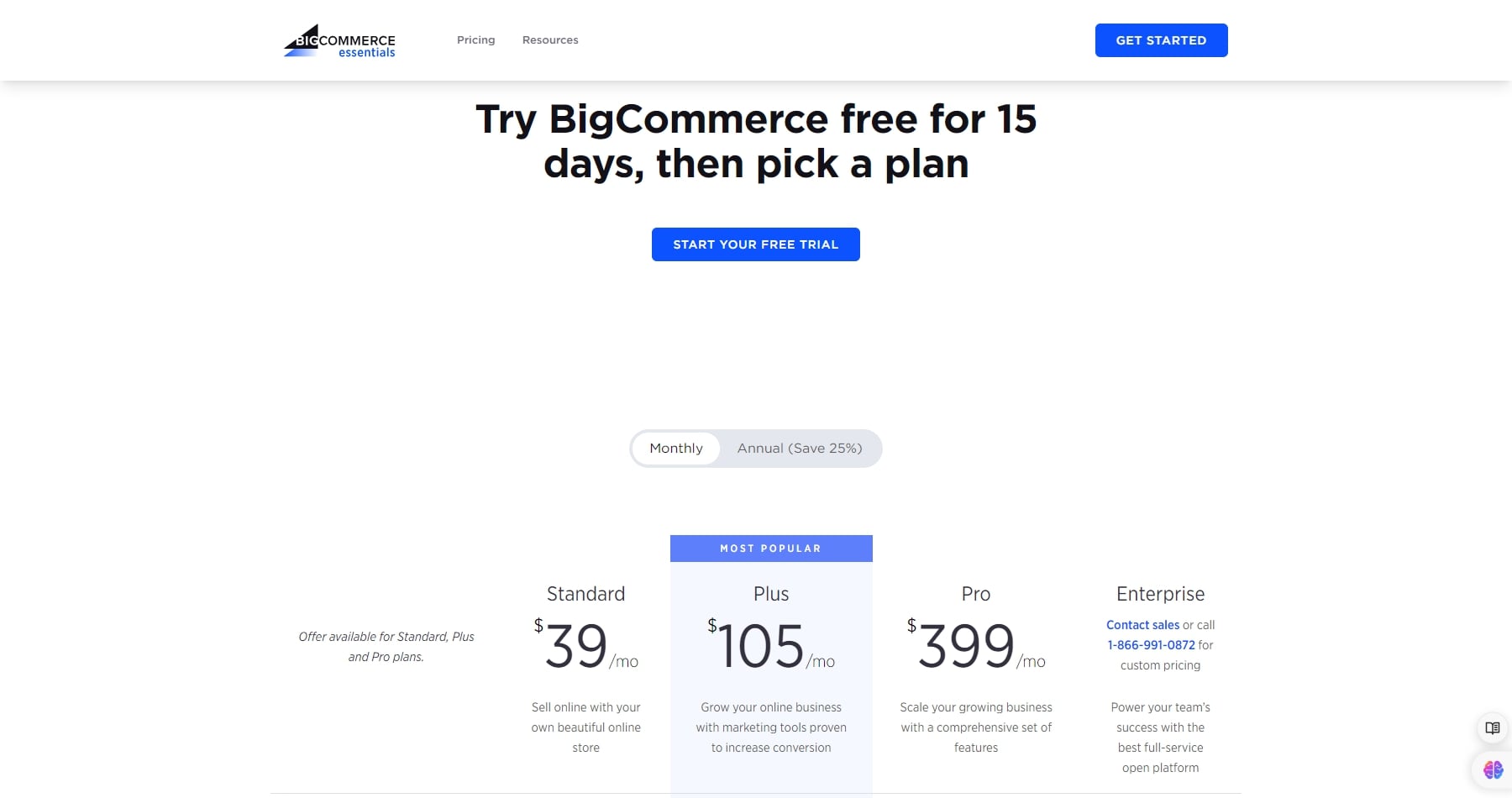
BigCommerce allows you to access the free plan for 15 days before deciding on your enterprise plan. Here are the premium plans of this platform:
- Standard ($39 per month): This plan is for individuals who can sell online with their online store. It provides up to three multi-storefronts and costs $30 monthly for an additional storefront. Moreover, it offers up to four inventory locations and makes $50k in online sales annually.
- Plus ($105 per month): This plan is for individuals who want to grow their eCommerce business by using marketing tools to boost their conversion rate. It provides up to five multi-storefronts and costs $50 monthly for an additional storefront. Moreover, it offers up to five inventory locations and makes $80k in online sales annually.
- Pro ($399 per month): This plan is for individuals wanting to scale their growing business with comprehensive features. It expands on the Plus plan by providing up to eight multi-storefronts, costing $100 monthly for an additional storefront. Moreover, it offers up to eight inventory locations and makes $400k in online sales annually.
It is also nice that all of these plans don’t have any additional transaction fees.
Shopify Pricing
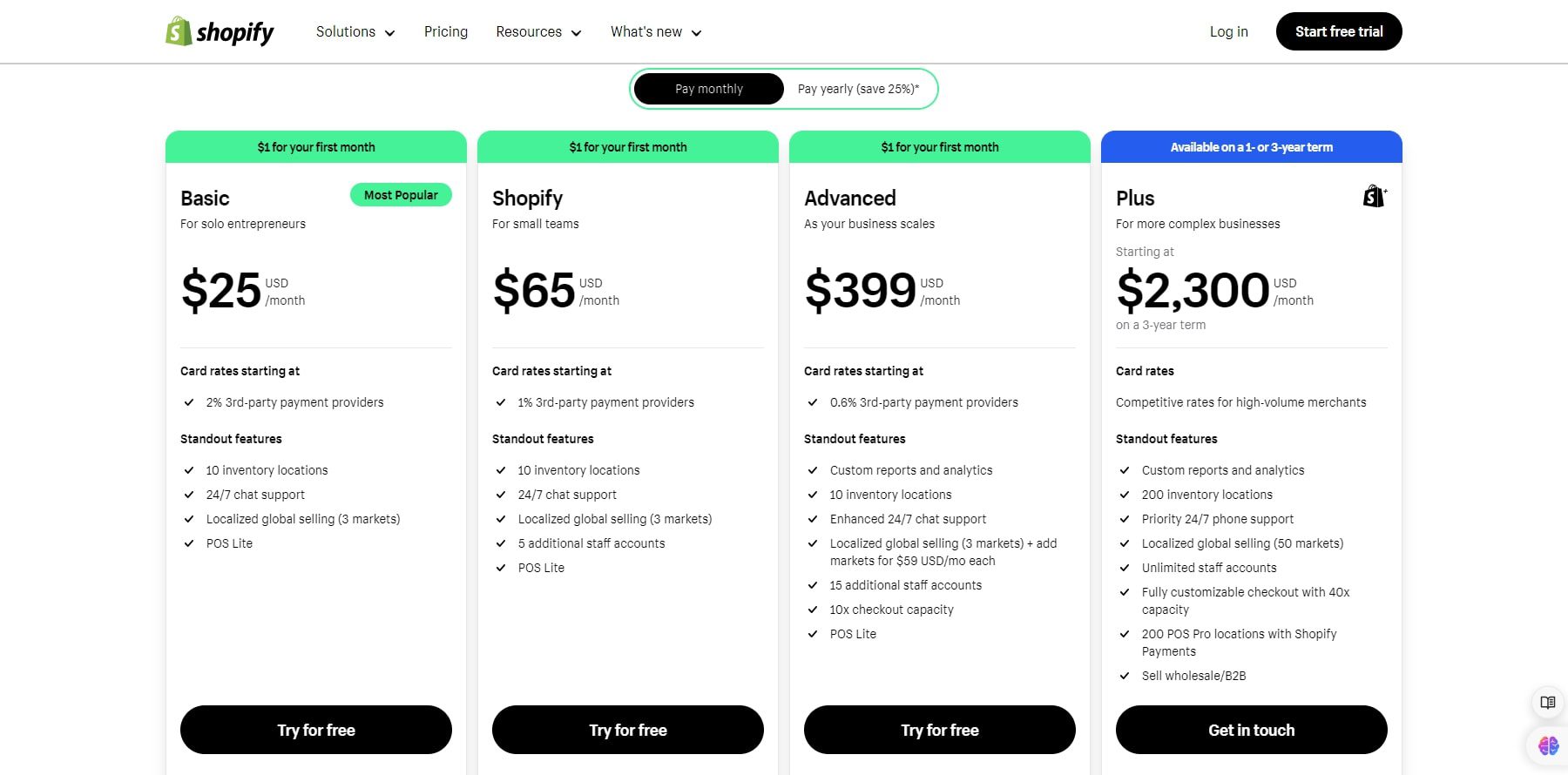
Shopify offers a versatile four-tiered pricing model designed to support the expansion of your eCommerce business with features that adapt to your growing needs.
- Basic Plan ($25/month): Ideal for new online stores, this plan offers more than just the basics. It includes essential features like website creation, payment processing, and basic reporting. It also provides shipping discounts and supports up to two staff accounts, making it perfect for starting your business.
- Standard ‘Shopify’ Plan ($65/month): This plan is tailored for mid-sized businesses and enhances the Basic plan with advanced reporting tools, increased shipping discounts, and support for up to five staff accounts. It’s an excellent choice for businesses aiming to expand and scale.
- Advanced Plan ($399/month): Designed for businesses at the height of their growth, it provides top-tier functionality. It features advanced reporting and the lowest credit card fees and supports up to fifteen staff accounts, ensuring that large businesses have everything they need to operate at full capacity.
- Plus Plan ($2300 per month): Positioned as the gold standard for leading eCommerce brands, this plan offers the most competitive transaction fee rates and a suite of tools for customizing analytics, checkout flows, wholesale items, and inventory management. Exclusive to one-year and three-year contracts, it provides comprehensive support for businesses aiming for the highest success.
Every plan provides 24/7 customer support via chat or email, while phone support is exclusively available with the Plus plan. You can also take advantage of their 3-day free trial.
Winner: Shopify
Shopify offers more competitive rates across its tiers, catering to various business needs and stages of growth. With lower entry-level pricing starting from $25/month compared to BigCommerce’s $39/month, Shopify provides a cost-effective option for new online stores.
Ease of Use
Having a user-friendly platform is crucial when setting up your online store. However, overlooking a platform just because it requires a bit of learning isn’t wise either. It’s about finding the sweet spot. Let’s explore how BigCommerce and Shopify measure up in this aspect.
BigCommerce Ease of Use
BigCommerce is designed for inexperienced website owners, with a user-friendly interface for beginners. It’s also flexible for experienced users and developers who want to modify store code, making it a solid choice for those interested in coding or building from scratch.
BigCommerce uses a simple content management system with a modern dashboard and website editor. Adding products is as easy as filling out a quick form for each item. Plenty of helpful tips guide you through the process.
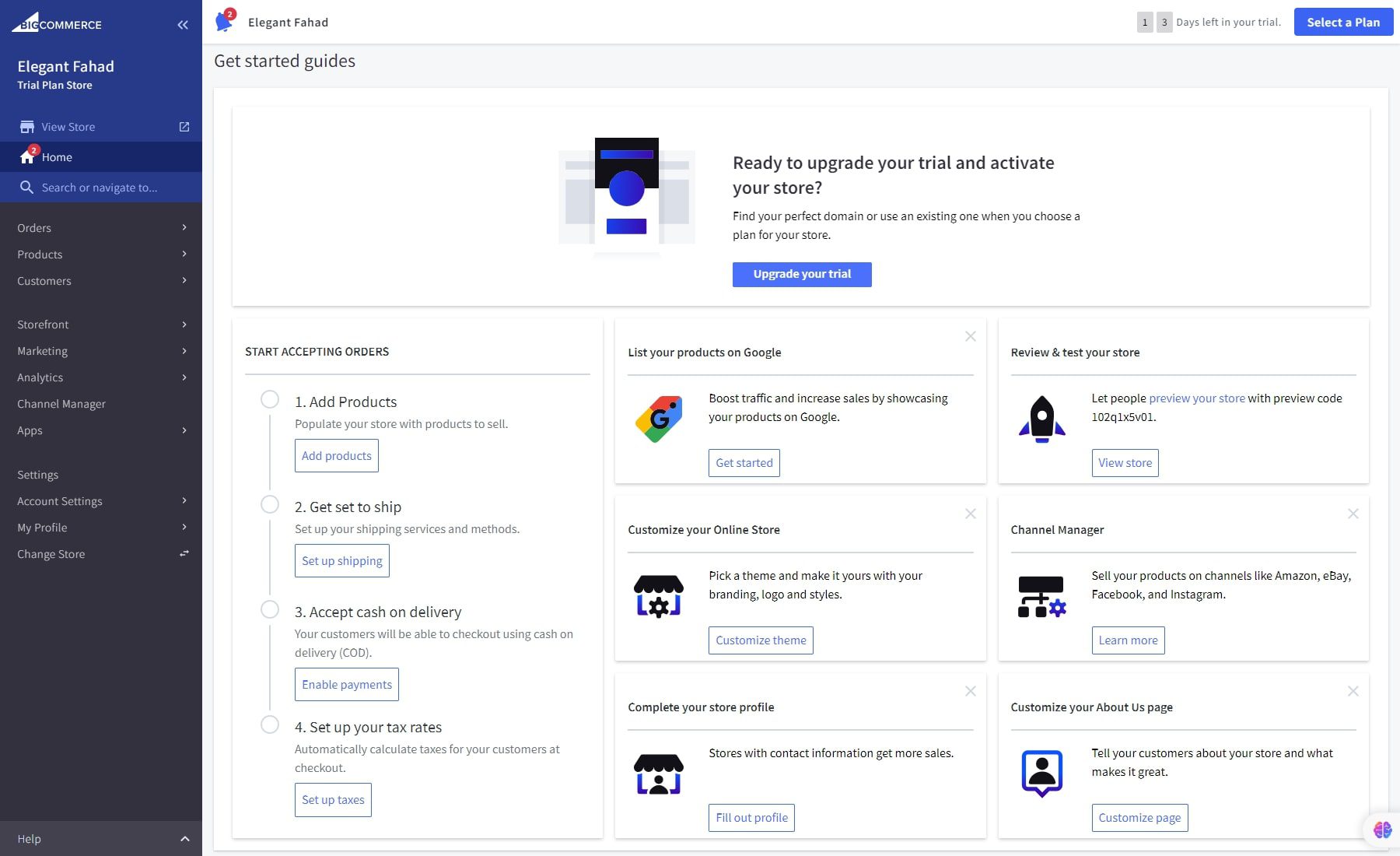
Recently, BigCommerce improved its user interface. The new design is more intuitive, making it easier to navigate and use. One standout feature is its drag-and-drop builder, which allows you to design your store by simply grabbing an element and placing it wherever you want. This design flexibility makes creating the look and feel you want for your store easier.
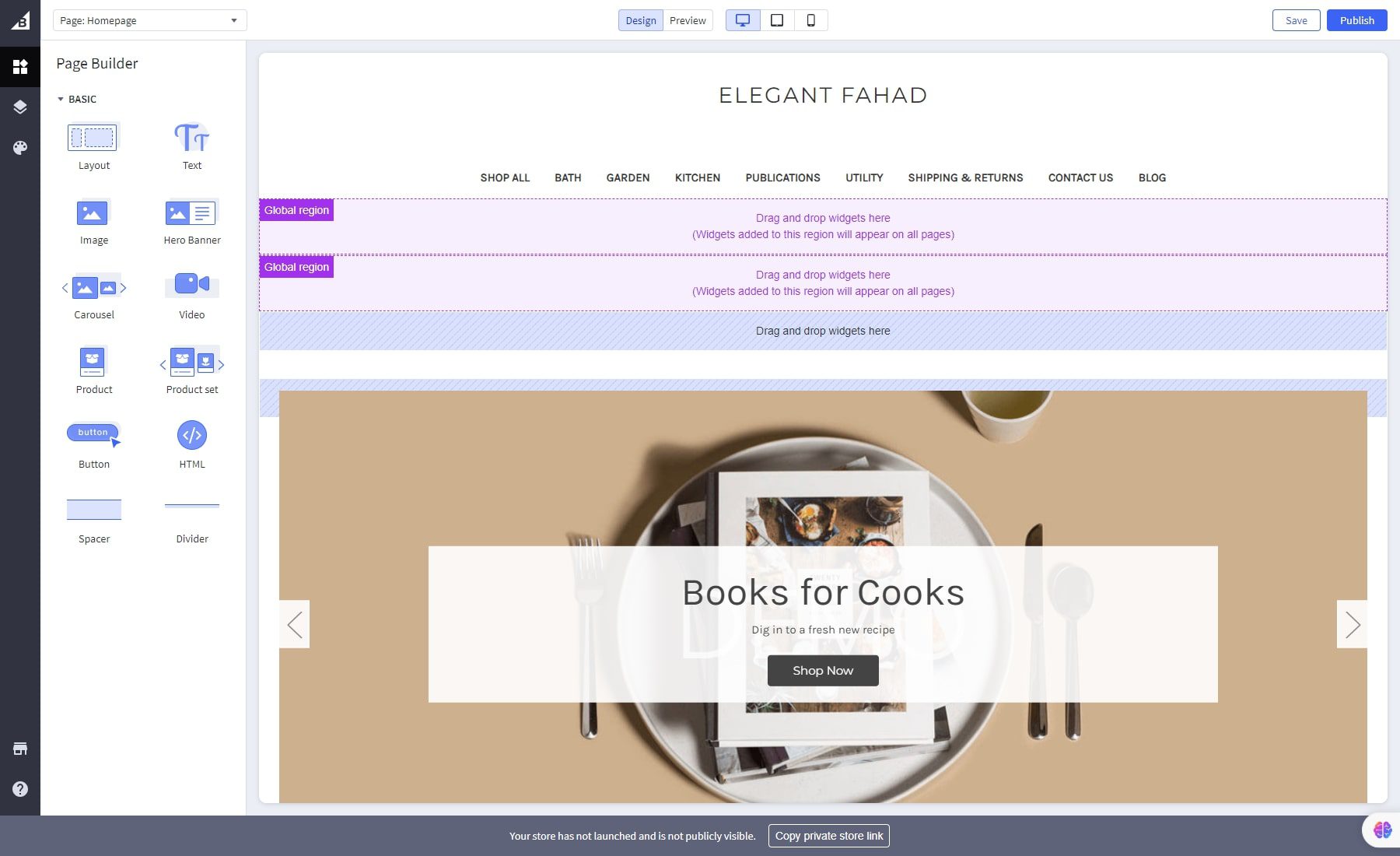
Understanding how BigCommerce operates and getting started with building your store will require some time. However, once you become familiar with it, you can utilize its built-in features to expand your business. If you need help while building your site, the page builder offers a search bar to find answers to problems you may encounter or suggested products from the marketplace.
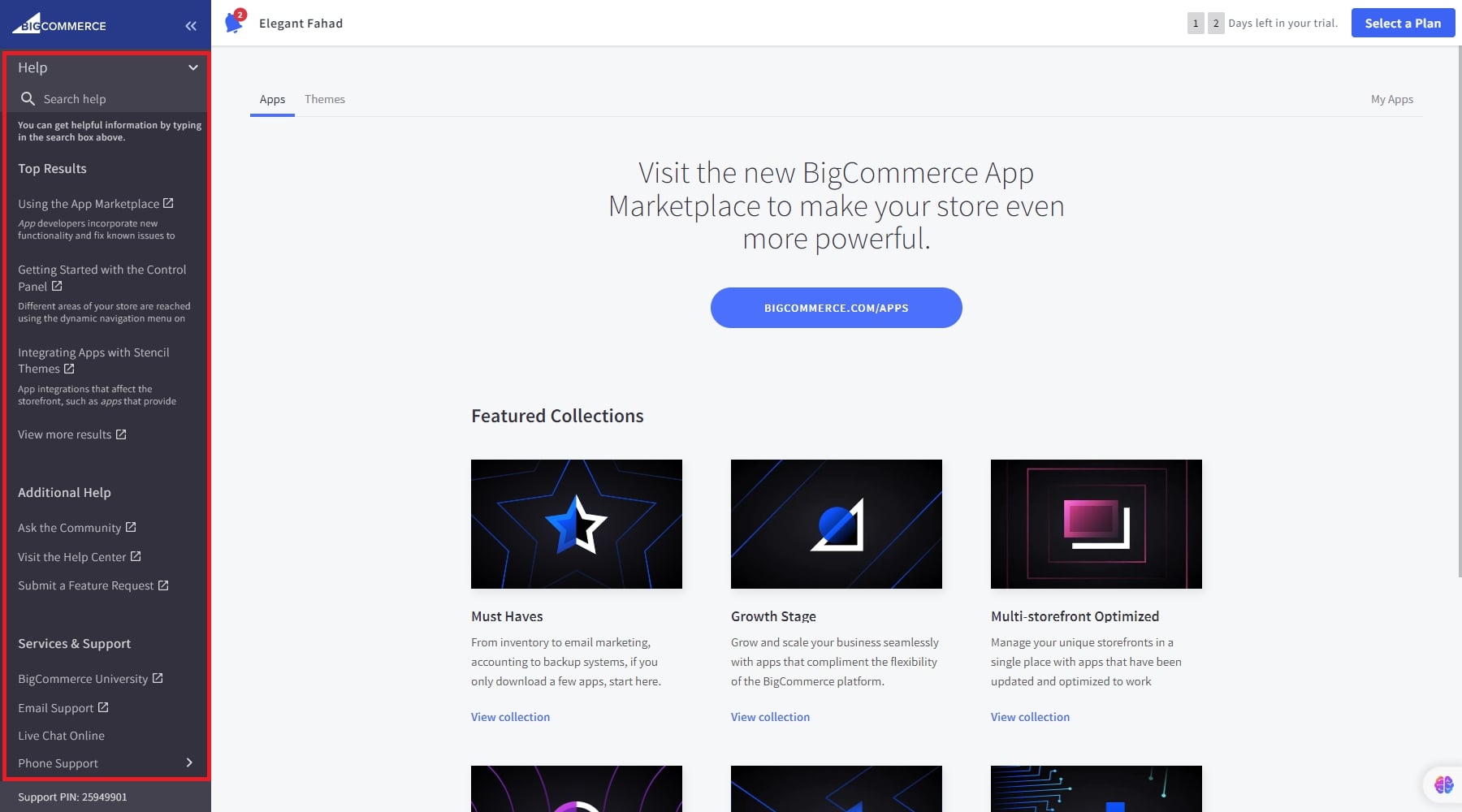
If you need further assistance, you can ask the community, visit the BigCommerce help center, or submit a feature request. You can also chat online with staff members and find international phone numbers for additional support.
Shopify Ease of Use
Shopify is a popular choice for beginners setting up online stores. Like BigCommerce, it features a straightforward content management system, a modern dashboard, and a simple website editor, allowing users to get their stores up and running quickly.
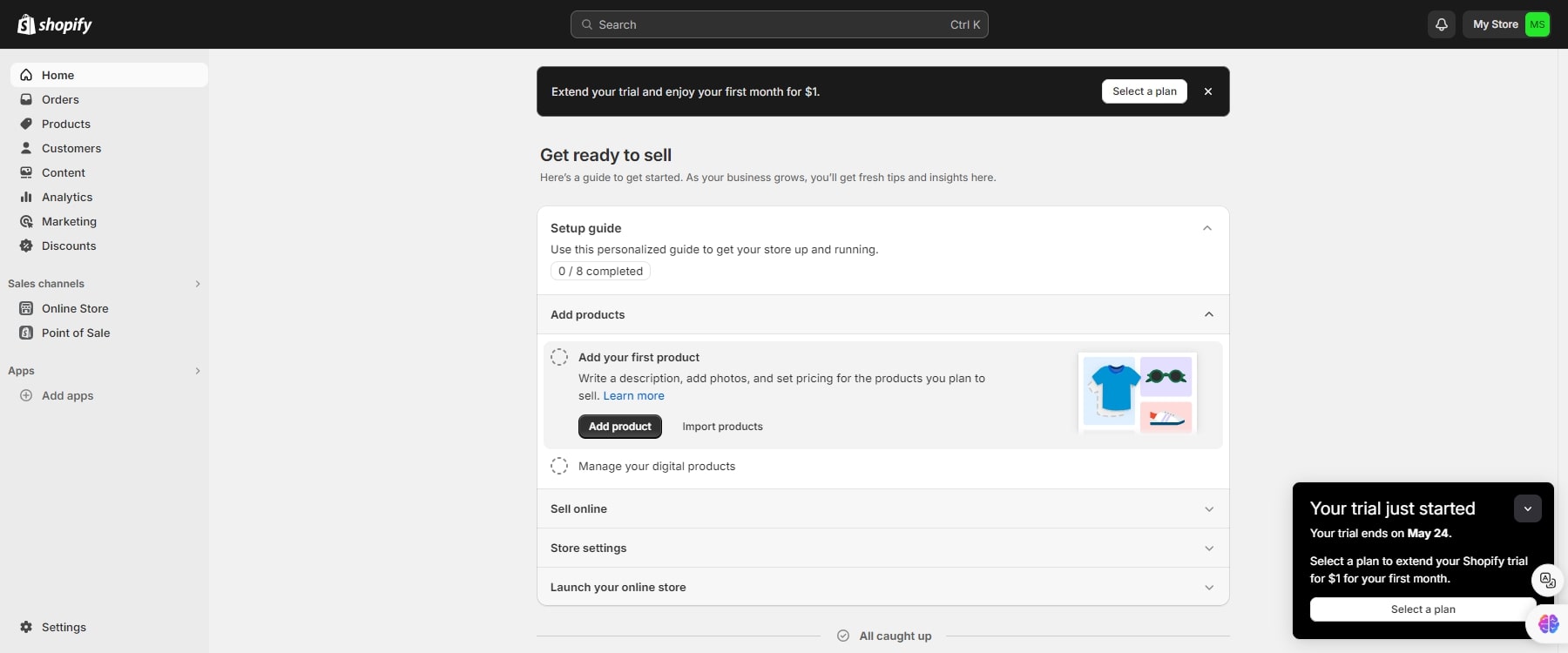
One of Shopify’s highlights is how simple it is to add products. You fill out a quick form for each item, and the platform offers plenty of pointers to help you optimize your listings. This ease of use makes it accessible even for those with little technical expertise.
While Shopify may not offer the same hands-on editing experience as other platforms, it allows you to rearrange page elements from a list. This method is less flexible than drag-and-drop editing but still provides a straightforward way to organize your store’s layout.
Winner: Shopify
Shopify is easier to use than BigCommerce, especially for beginners. While BigCommerce has powerful features and a flexible drag-and-drop builder, it’s more complex and harder to learn. Shopify is praised for its simple setup process, easy-to-use editor, and helpful step-by-step guide. The main menu on the left makes it easy to find everything you need. Moreover, Shopify’s new AI tool for writing product descriptions makes it even more user-friendly.
Themes and Design
When choosing your first eCommerce platform, it’s hard to know all the design features you’ll need in the future. That’s why the design and themes available are important factors to consider. Both BigCommerce and Shopify offer various design options but differ in their approach.
Bigcommerce Themes and Design
BigCommerce offers a selection of 12 free themes, providing a good starting point for new businesses looking to keep initial costs low. While these free themes are basic, they are designed to help you create an attractive storefront. As your business grows, you may need to upgrade to a paid theme that reflects your brand and offers more advanced features.
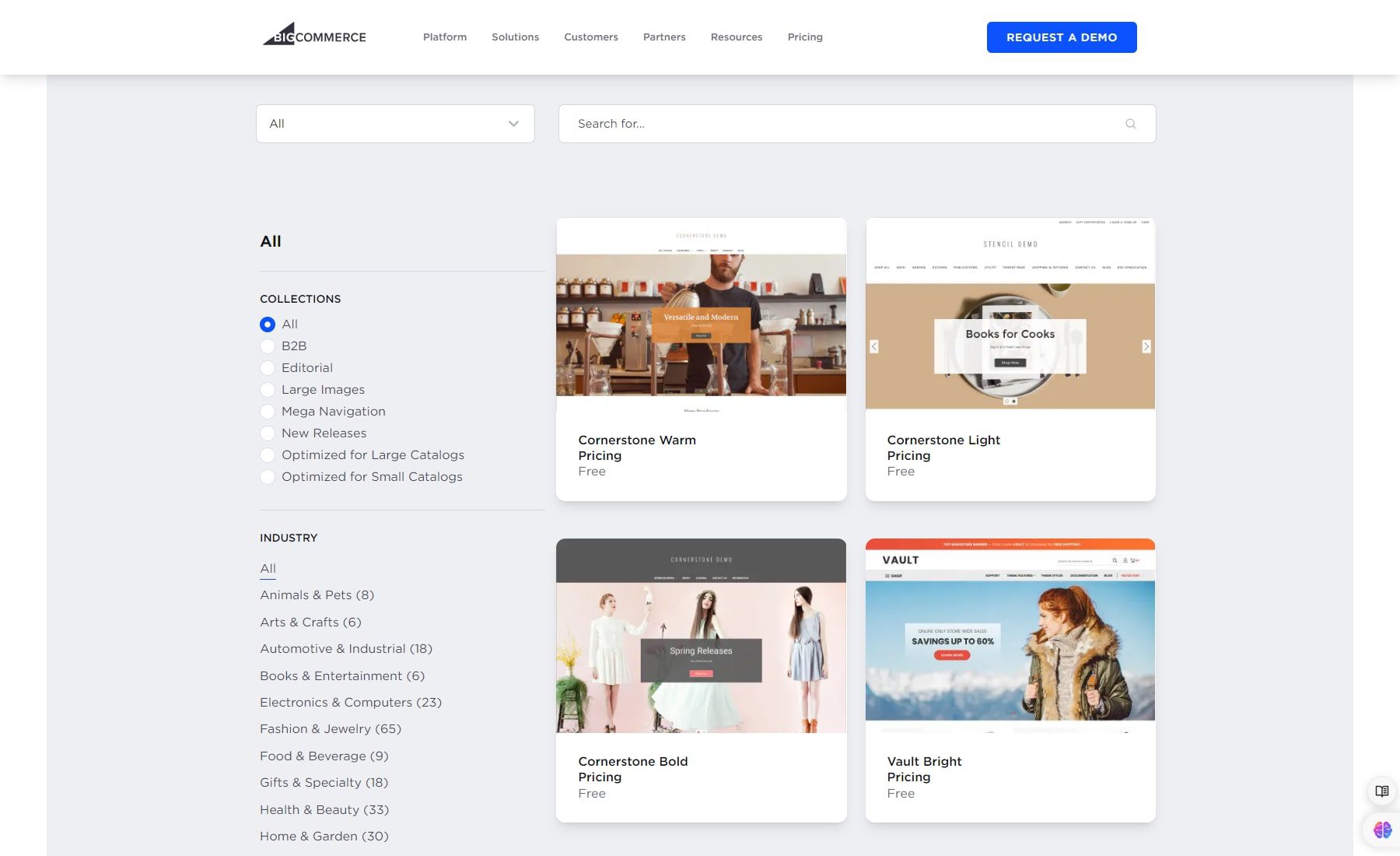
BigCommerce provides 181 paid themes, ranging from a one-time payment of $150 to $300. These themes cater to various industries, including food and drink, home and garden, and more. You can browse themes based on industry, catalog size, layout, and additional criteria to find the perfect fit for your store. Each theme typically comes with multiple color and style options, allowing further customization to match your brand’s identity.
Although BigCommerce offers many themes, some are variations within the same template family. For example, the Elevate Outdoors template family includes different styles of the same layout listed as separate templates. This means the variety of unique template styles is similar to other platforms.
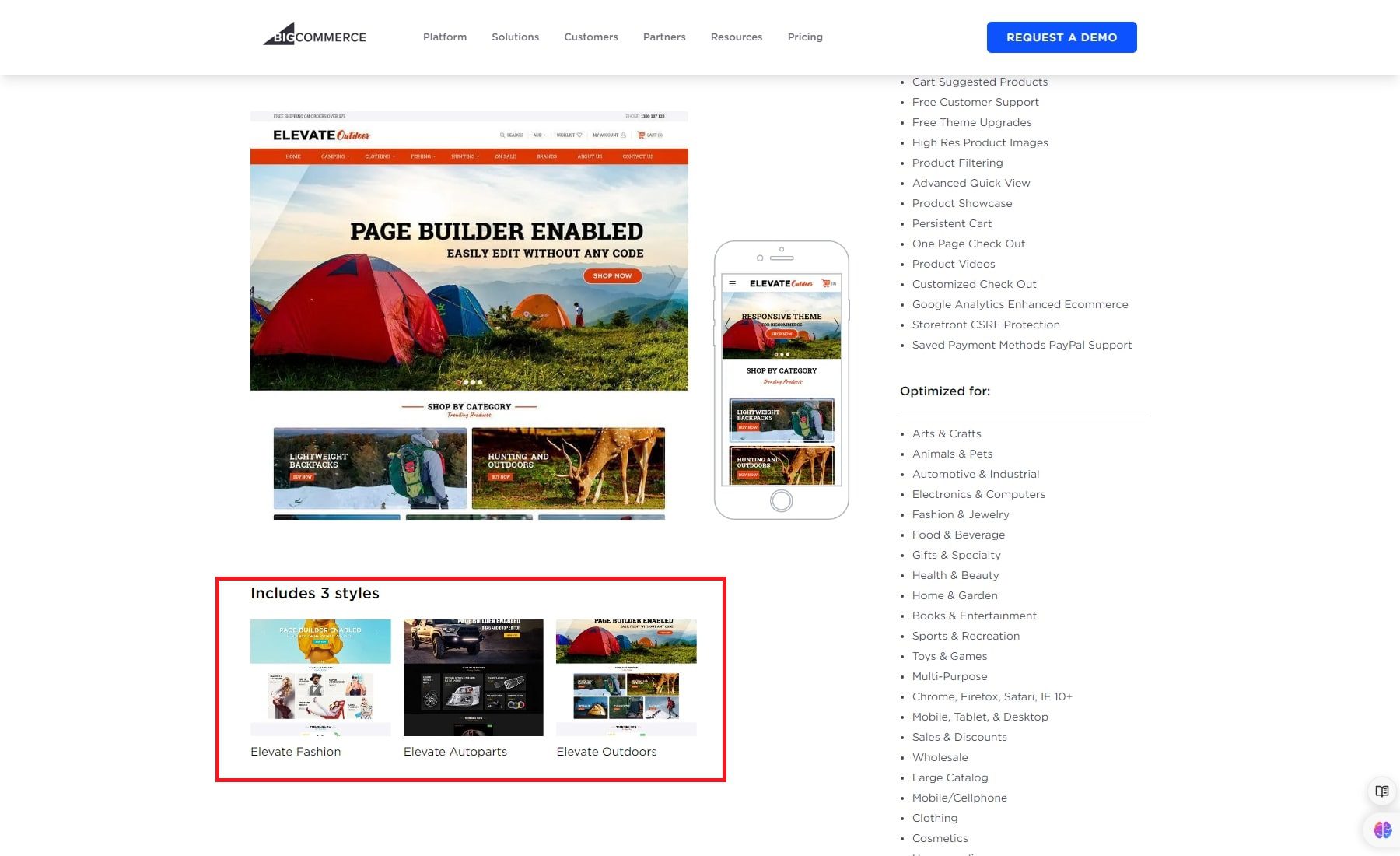
BigCommerce’s themes are designed to be user-friendly and highly customizable. You can personalize your chosen theme to suit your needs and preferences, ensuring that your online store looks professional and is tailored to your brand. All themes are mobile responsive, automatically adjusting to fit different screen sizes, and you can edit both desktop and mobile versions to ensure a consistent and appealing look across all devices.
Shopify Themes and Design
Shopify is known for having some of the best-looking themes for online stores. It offers a selection of 13 free themes, making it easy for new businesses to create an attractive storefront without additional costs. These free themes are designed to be visually appealing and require minimal tweaking, setting you up for success.

As your business grows, you may want to upgrade to a paid theme that reflects your brand and offers more advanced features. Shopify provides 182 paid themes, ranging from $100 to $400 for a one-time payment. These themes are tailored for various industries, such as food and drink, home and garden, and more. You can search for themes based on the number of products, layout style, navigation menu styles, and other criteria to find the perfect fit for your store.
Most Shopify themes come with two or three color and style options, allowing additional customization. For example, the Agile theme offers multiple style variations to choose from. Shopify’s themes are also easy to personalize further, and you can switch your theme at any time to keep your store’s design fresh and up-to-date.

Shopify’s themes are responsive, so you can rest assured they will look good on different screen sizes and mobile devices. een sizes. You can even edit desktop and mobile versions to your liking and preview how your site will appear on smartphones and tablets.
Winner: Shopify
While BigCommerce offers more flexibility in design, Shopify’s intuitive platform allows for a greater variety of online stores to flourish. With a diverse selection of free and paid themes, Shopify provides businesses with the tools to create visually appealing and professional storefronts that effectively engage customers.
Business & Commerce Features
When people compare BigCommerce and Shopify, they mostly look at what they offer for businesses, especially eCommerce. Both these platforms have plenty to offer in this regard. Let’s look at how both help businesses sell stuff online.
Bigcommerce Business & Commerce Features
BigCommerce does not include a built-in payment processor. Instead, users need to find payment integrations through the BigCommerce App Store. It offers over 65 payment gateway integrations in over 100 countries, supporting 250+ local payment methods, including Amazon Pay, PayPal, Square, Stripe, and Authorize.net. These integrations include notable features such as no transaction fees from BigCommerce, PCI compliance, and mobile optimization.
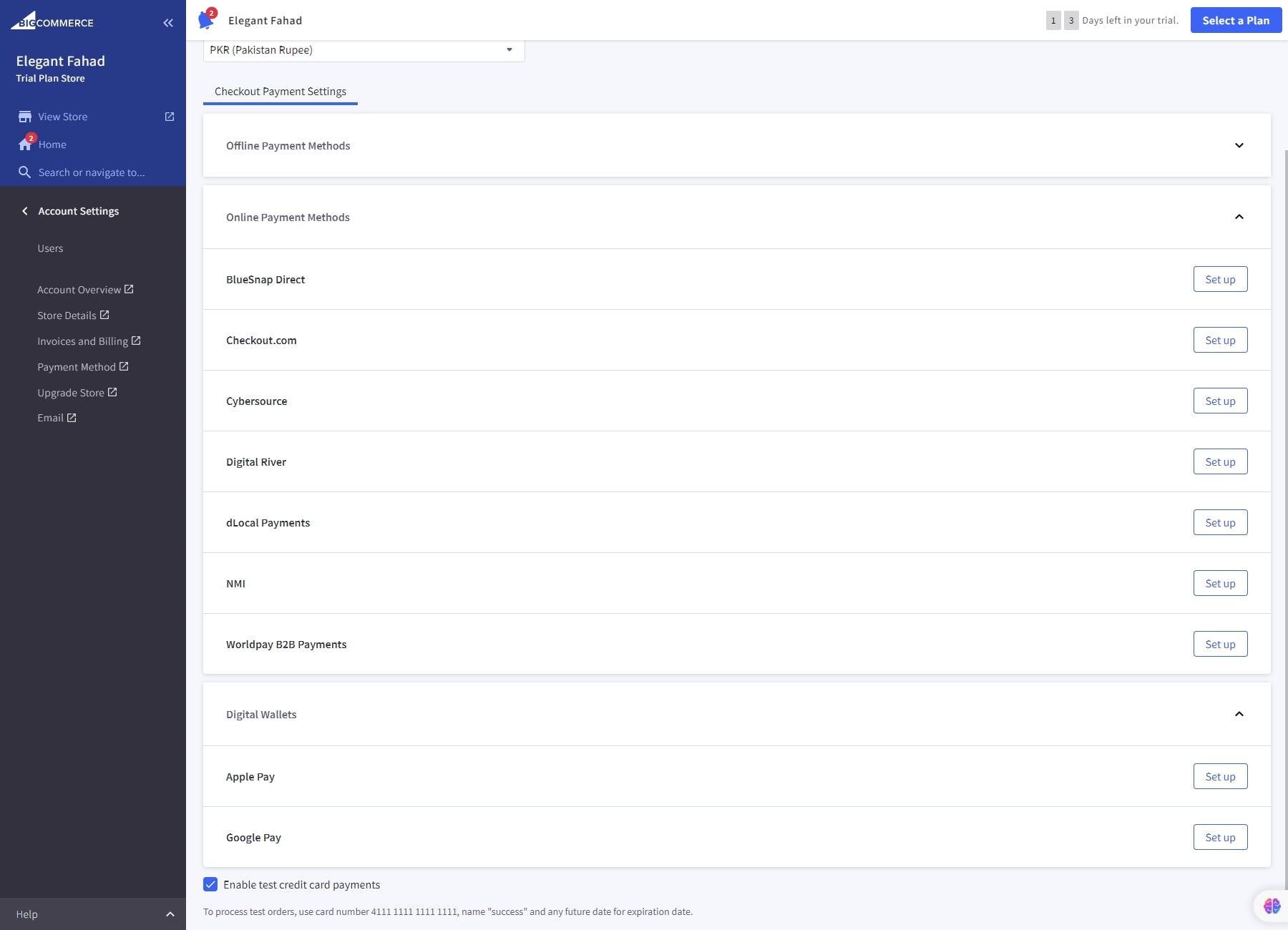
BigCommerce boasts a decent app marketplace, particularly for product-sourcing apps. However, the quality of other apps varies, and some are not as comprehensive as those offered by competitors.
For inventory management, BigCommerce provides a simple, native, and robust system to manage stock levels and order trends. This system ensures seamless integration between online and offline channels, helping to keep inventory on track. Additionally, the platform allows selling physical, digital, and service-based products without additional apps.
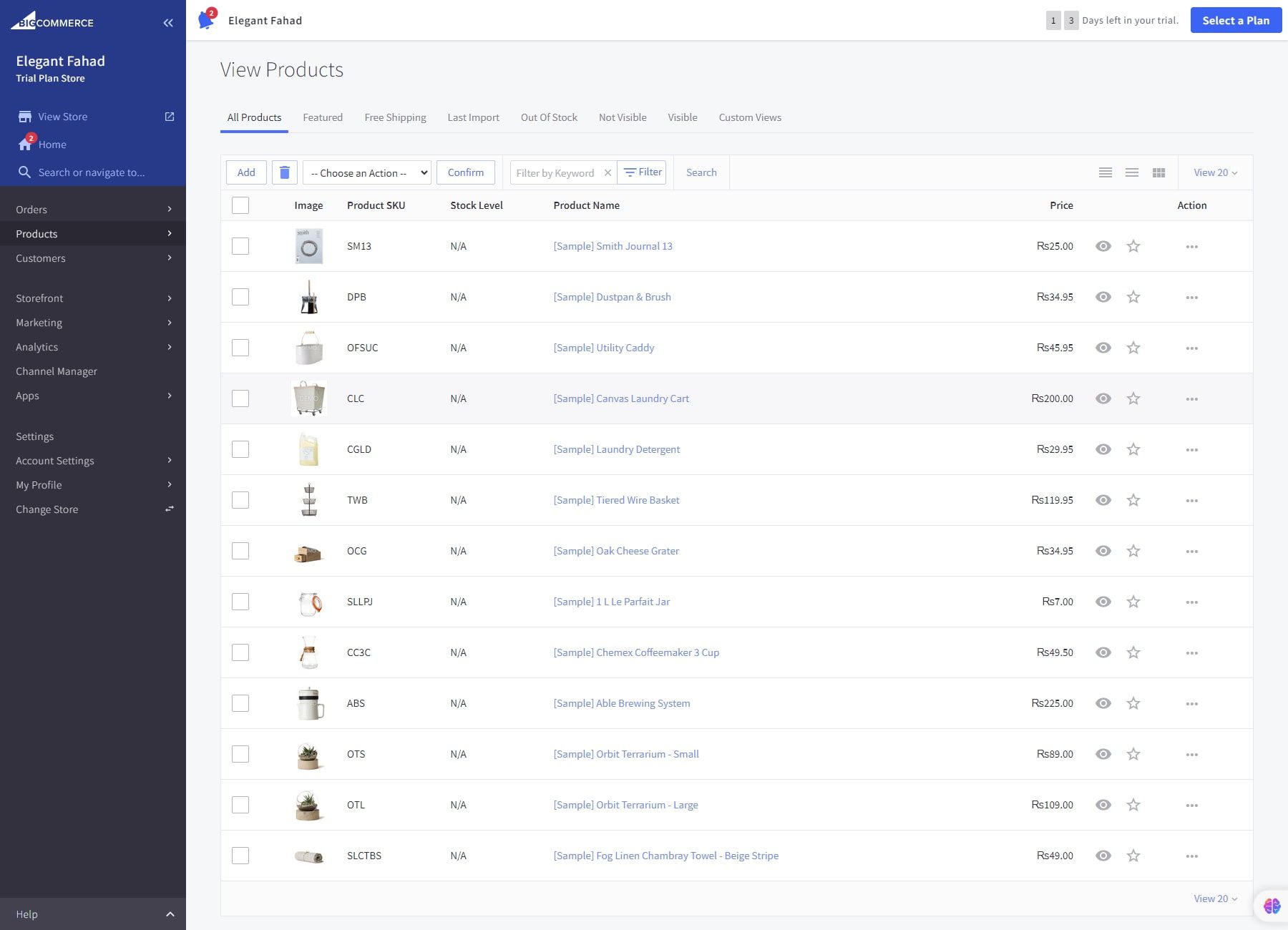
Regarding sales channels, BigCommerce’s Channel Manager is designed to help merchants grow their sales and simplify multi-channel selling. Users can easily connect their store with various sales channels, including marketplaces like eBay, Amazon, and Walmart, as well as social channels like Facebook and Google.
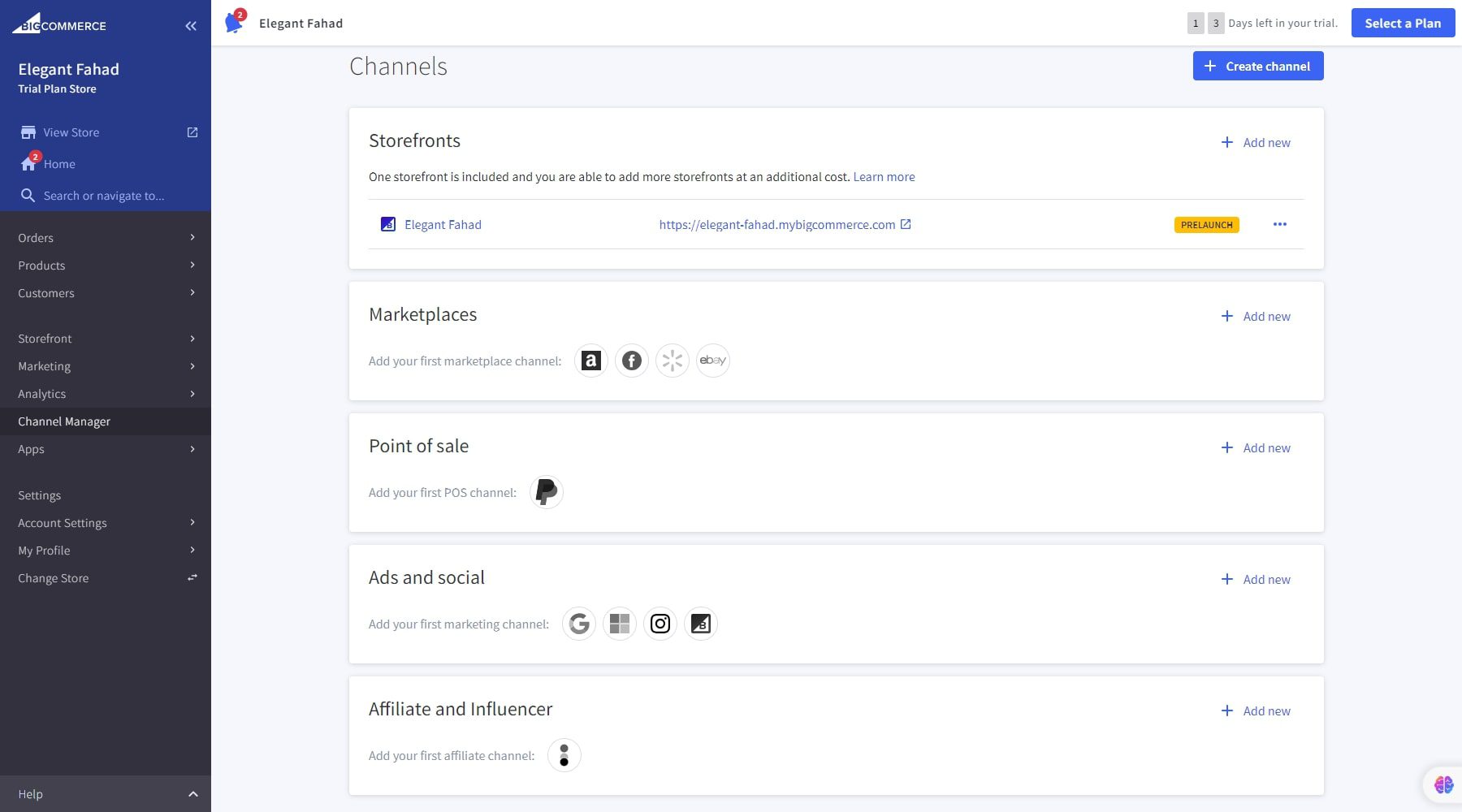
BigCommerce also offers flexibility in point-of-sale (POS) systems by allowing connections with PayPal Zettle POS, a comprehensive POS solution. This feature helps manage product catalogs from a single location and syncs inventory across all online and offline channels without additional fees.

Shopify Business & Commerce Features
Shopify is the king of online selling and provides a comprehensive suite of commerce features tailored to meet the needs of online sellers. One key feature is Shopify Payments, an in-house payment service that securely processes transactions and transfers funds directly to store owners. This ensures quick and secure transactions for buyers and sellers. Additionally, Shopify supports over 100 third-party payment gateways, allowing sellers to choose the best option for their business needs.
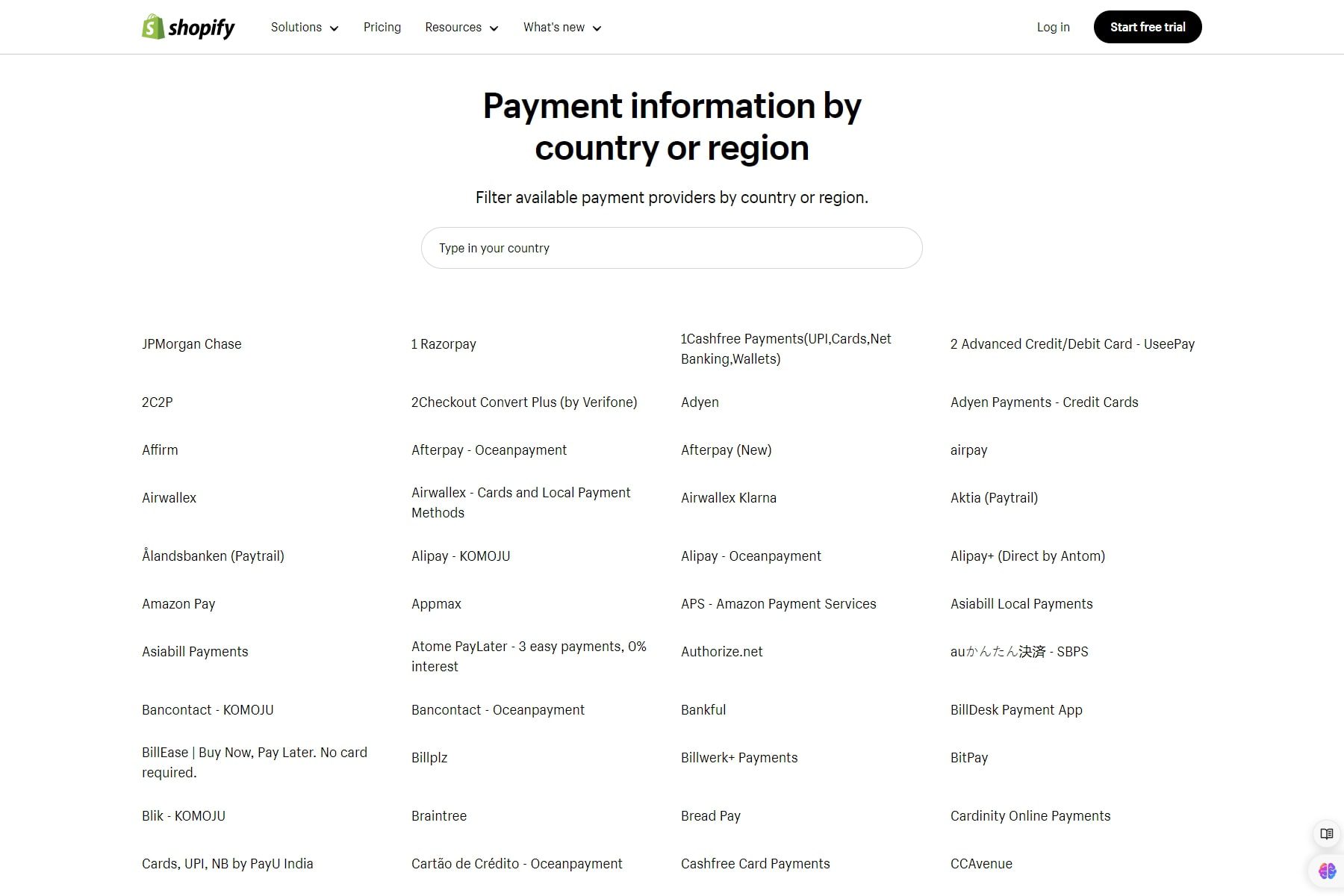
Shopify offers dropshipping by partnering with leading suppliers like Dsers and Dropified, offering a vast selection of goods at wholesale prices. These partnerships enable dropshippers to source products easily and streamline their operations, enhancing efficiency and profitability.

Regarding sales, Shopify’s inventory management tools empower sellers to track inventory levels, make adjustments, and view the history of inventory changes for product variants. Moreover, Shopify enables sellers to expand their reach by selling products across multiple online sales channels, including Facebook, Amazon, eBay, and Instagram. This multichannel selling approach allows sellers to reach a broader audience and maximize sales opportunities.

For in-person sales, Shopify provides a user-friendly point-of-sale (POS) system through a mobile application available on iOS and Android devices. This POS system seamlessly integrates with Shopify, enabling sellers to process transactions on the go easily and manage their offline sales operations.
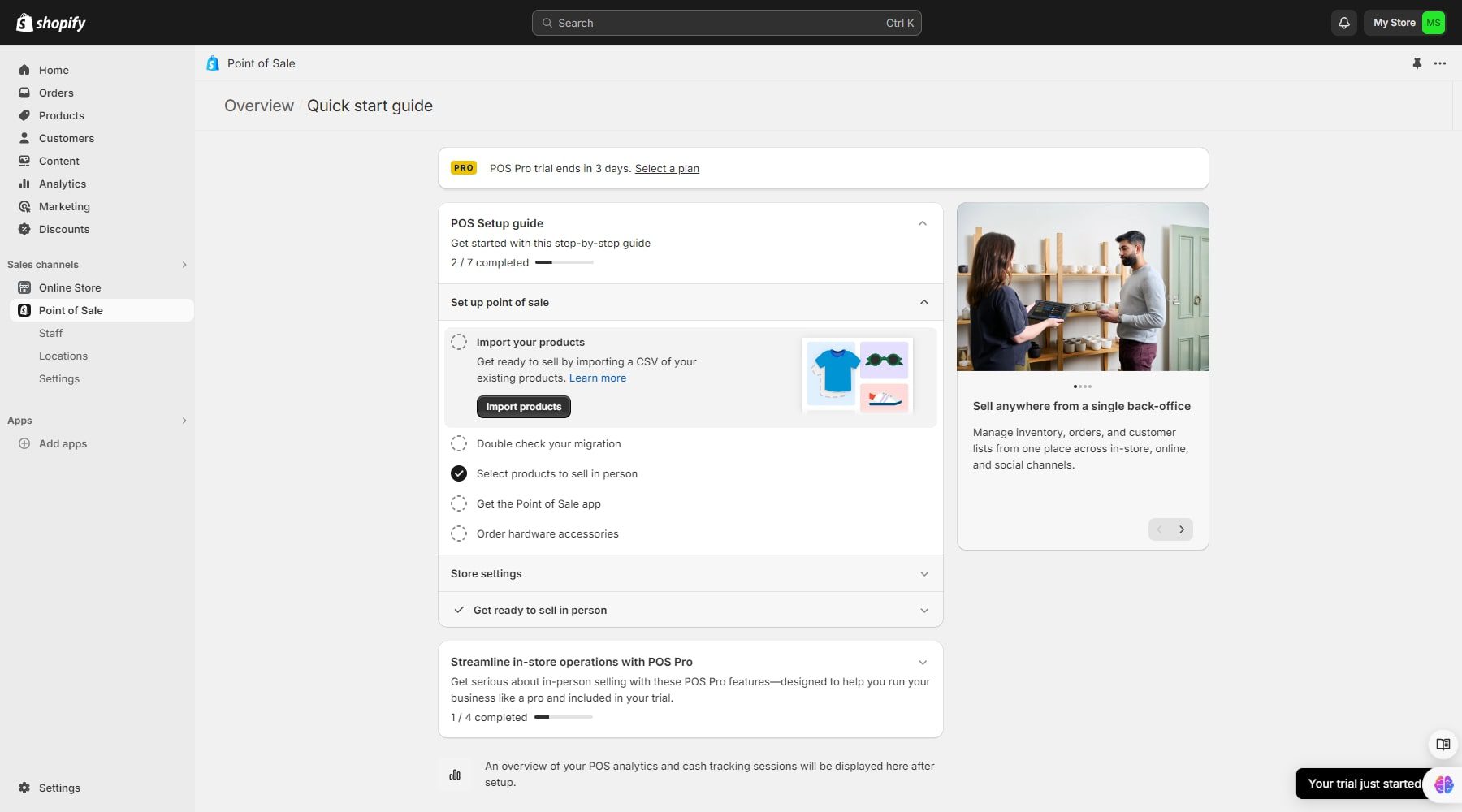
Winner: BigCommerce
BigCommerce has an edge over Shopify in business and commerce features. Unlike Shopify, it doesn’t charge transaction fees, which can save online merchants a lot of money. It also offers strong integration with popular payment providers. Additionally, BigCommerce allows you to sell and manage physical products without a third-party app. And it has more built-in sales features that work seamlessly across various channels and POS systems, making it particularly beneficial for businesses with complex omnichannel needs.
AI-Powered Features
Both platforms offer a range of AI-driven tools designed to enhance the online shopping experience and streamline business operations. Let’s look at how both use AI to help businesses thrive in the digital marketplace.
BigCommerce AI-Powered Features
In July 2023, BigCommerce introduced Google Cloud AI-powered eCommerce features. Although these features have not been publicly available, users have embraced their app store to integrate AI into online store development. BigCommerce provides up to 60 AI apps on its app store, including the BigAI copywriting app.
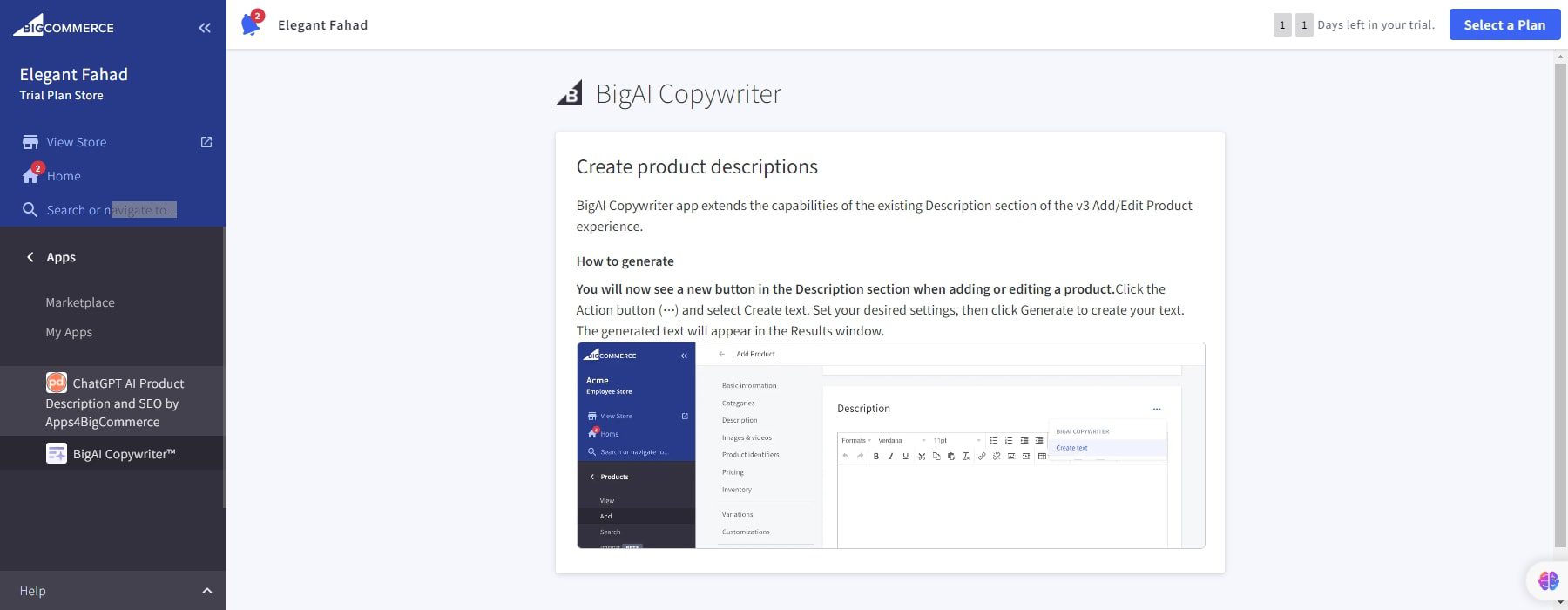
BigAI Copywriter is seamlessly built into your control panel’s add/edit product interface, providing powerful tools to quickly create engaging product descriptions that match your brand’s voice. Easily customize these descriptions with style, tone, keywords, and length settings, all optimized for SEO.
Shopify AI-Powered Features
Last year, Shopify introduced Shopify Magic, an integrated suite of AI tools to help build your online store. The AI writing tool is arguably the most popular amongst users as it enables them to generate product descriptions. With this tool, you only need to provide some basic product features, such as “t-shirt, white, medium,” and it will generate detailed product descriptions for you. You can customize the tone of voice, switching from playful to serious, to match your brand’s style.
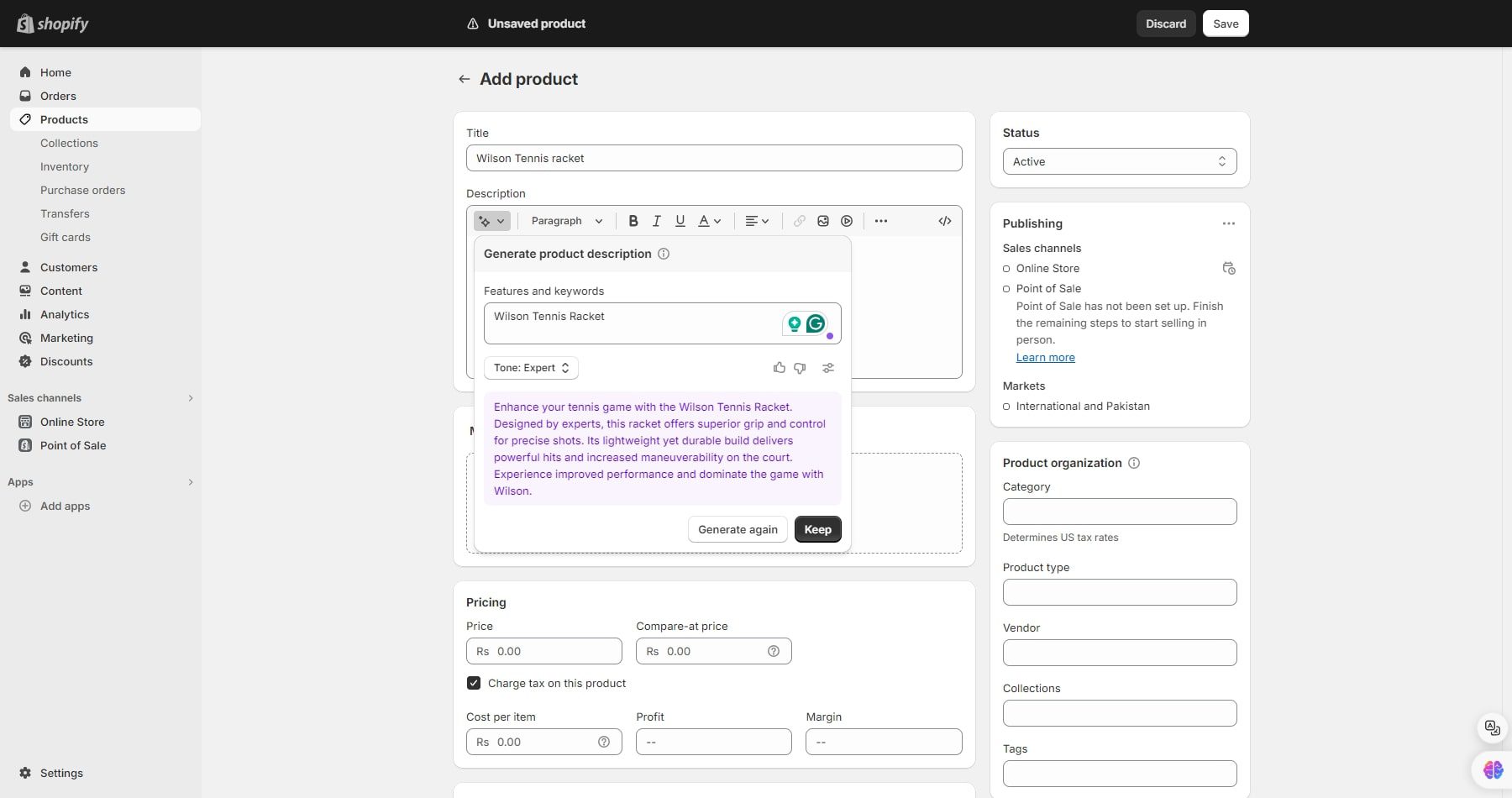
Transforming product image backgrounds has never been easier. Shopify’s AI-enabled image editing tool allows you to create professional product photos effortlessly. Input a few clicks or keywords and instantly generate, match, or remove backgrounds from your existing product images.
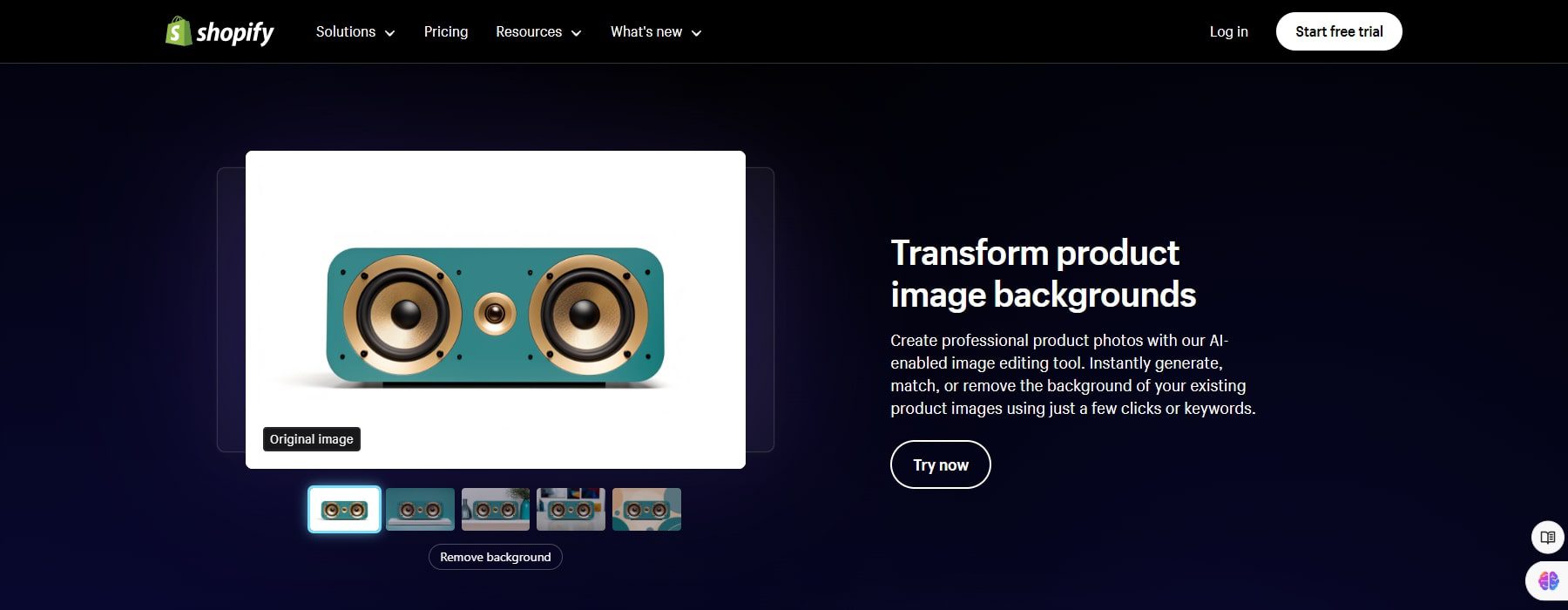
You can also use Shopify magic to boost your email effectiveness. The platform optimizes your email campaigns by determining the best time to send messages and generating compelling subject lines and copy. Hence, you will never have to start from scratch.
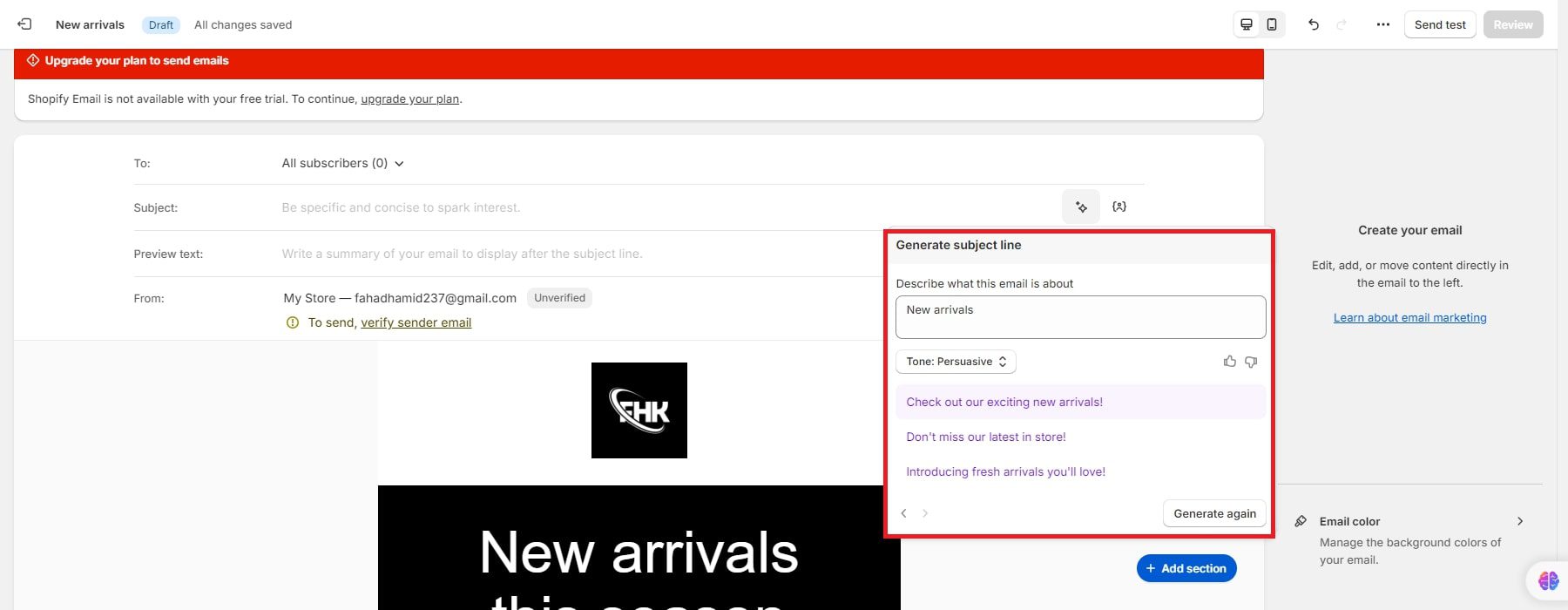
Additionally, Shopify Magic enables you to turn live chats into checkouts with personalized and relevant responses to customer questions. Reply quickly to enhance customer experience and increase your conversion rate, transforming more chats into successful sales.
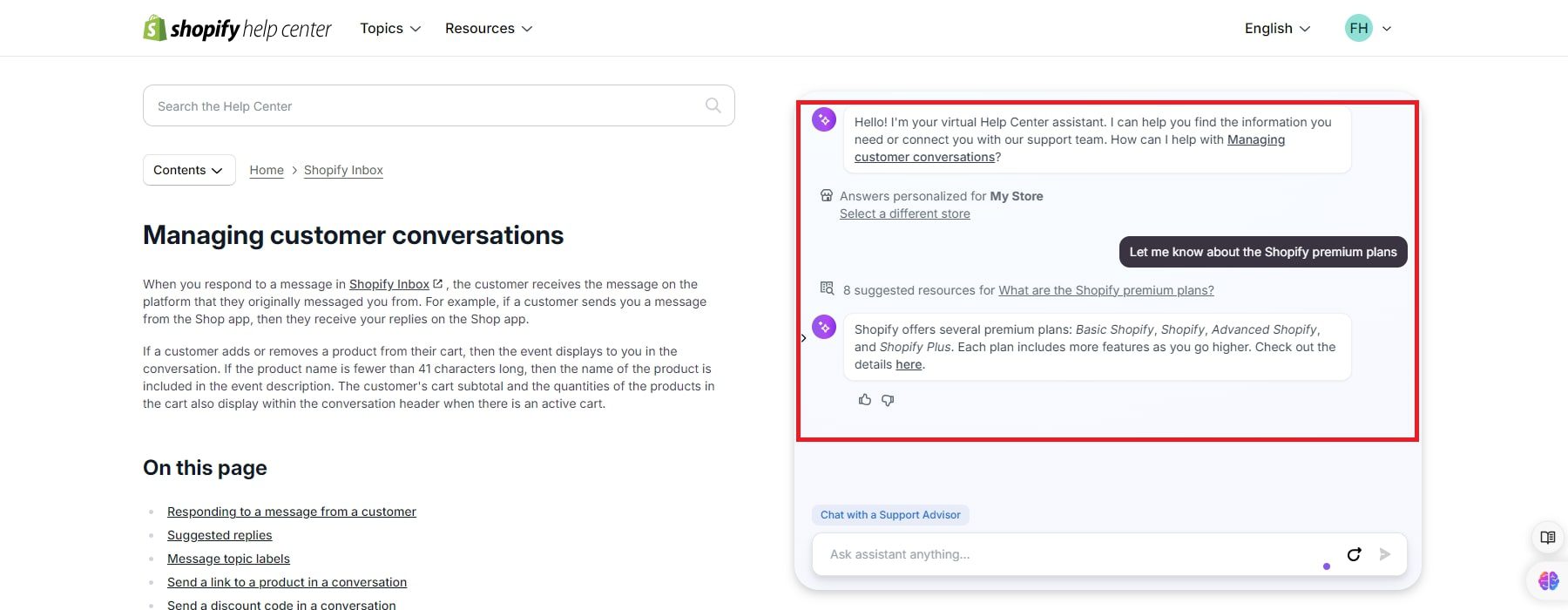
Lastly, Shopify provides over a thousand apps to help you integrate AI into your online store development. You can use them to write product descriptions, market your product, run successful email campaigns, or conduct SEO effectively.
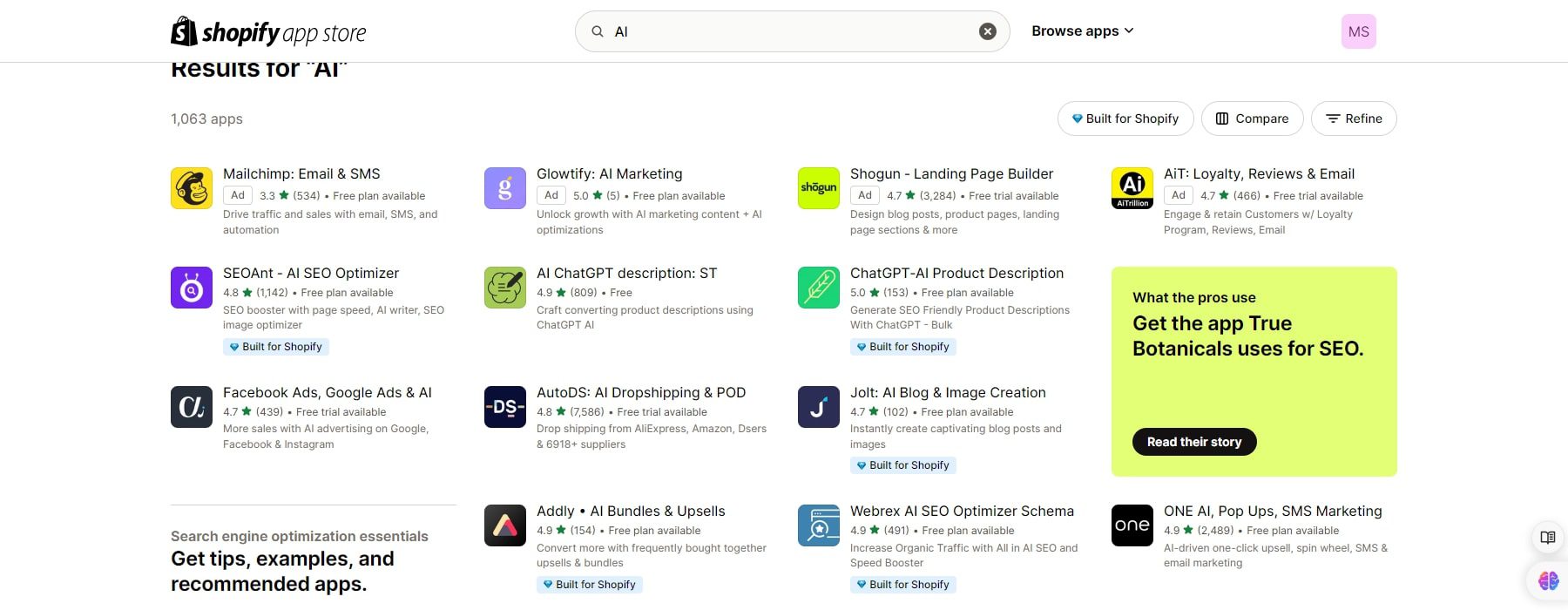
Winner: Shopify
Shopify excels with its advanced tools, such as Shopify Magic and the AI-enabled image editing tool. Shopify Magic enhances email campaigns by determining optimal send times and generating compelling content, while the image editing tool allows for effortless background transformations of product photos.
Marketing and SEO
Marketing and SEO are crucial for driving traffic to your website. When comparing BigCommerce vs Shopify, it’s important to identify which platform gives you an edge in creating a unique and powerful online presence for your business.
BigCommerce Marketing and SEO
Every BigCommerce plan includes creating discount codes, generating automatic sitemaps, and customizing URLs, title tags, and metadata to enhance SEO. Additionally, this platform provides one-click integration with Google Shopping and professional reporting tools. Advanced plans come with segmentation tools for personalizing the shopping experience and automated emails for recovering abandoned carts.
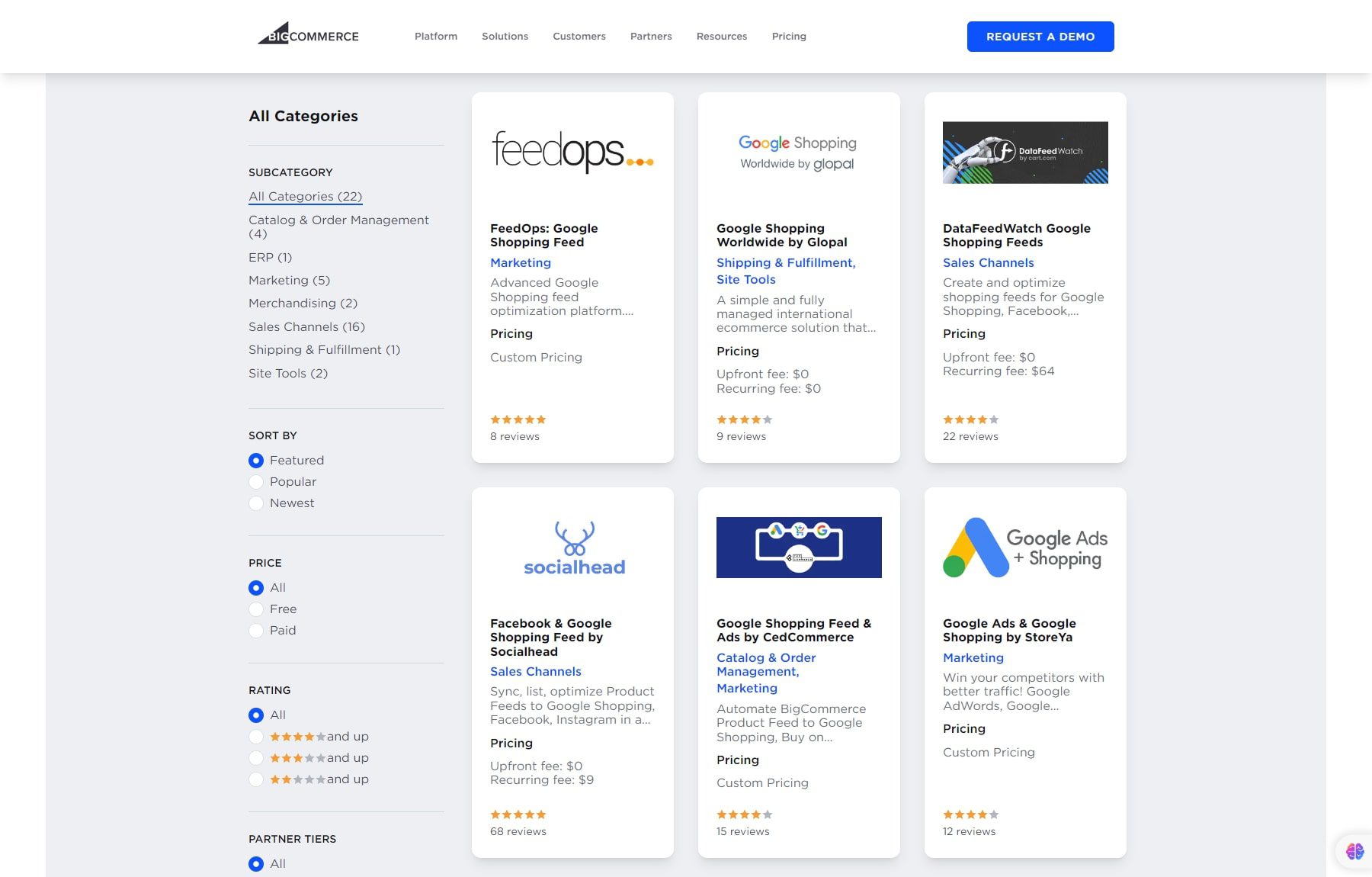
Email marketing is also made easy with BigCommerce, as it syncs data with leading email platforms like MailChimp and G Suite. Integrating marketing applications such as MailChimp can further enhance your marketing efforts by offering more flexible email design options.

One standout feature is BigCommerce’s robust built-in SEO practices, which ensure that all sites adhere to industry standards. Users have full control over URLs, title tags, header tags, and metadata, and 301 redirects are automatically created when changes are made to product names or URLs.
Shopify Marketing and SEO
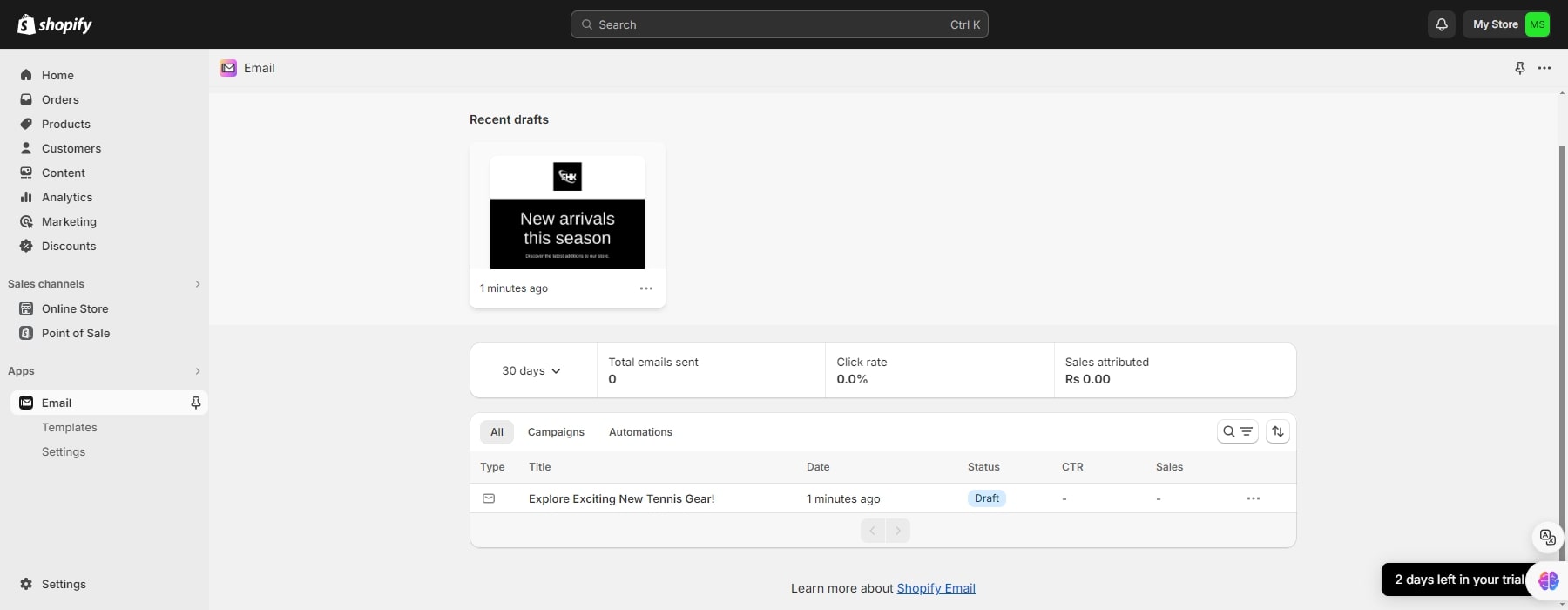
Shopify offers built-in tools for effective email marketing, allowing you to build strong customer relationships. It includes ready-made templates that can be quickly applied, and you can manage and analyze all your marketing activities directly from the dashboard.
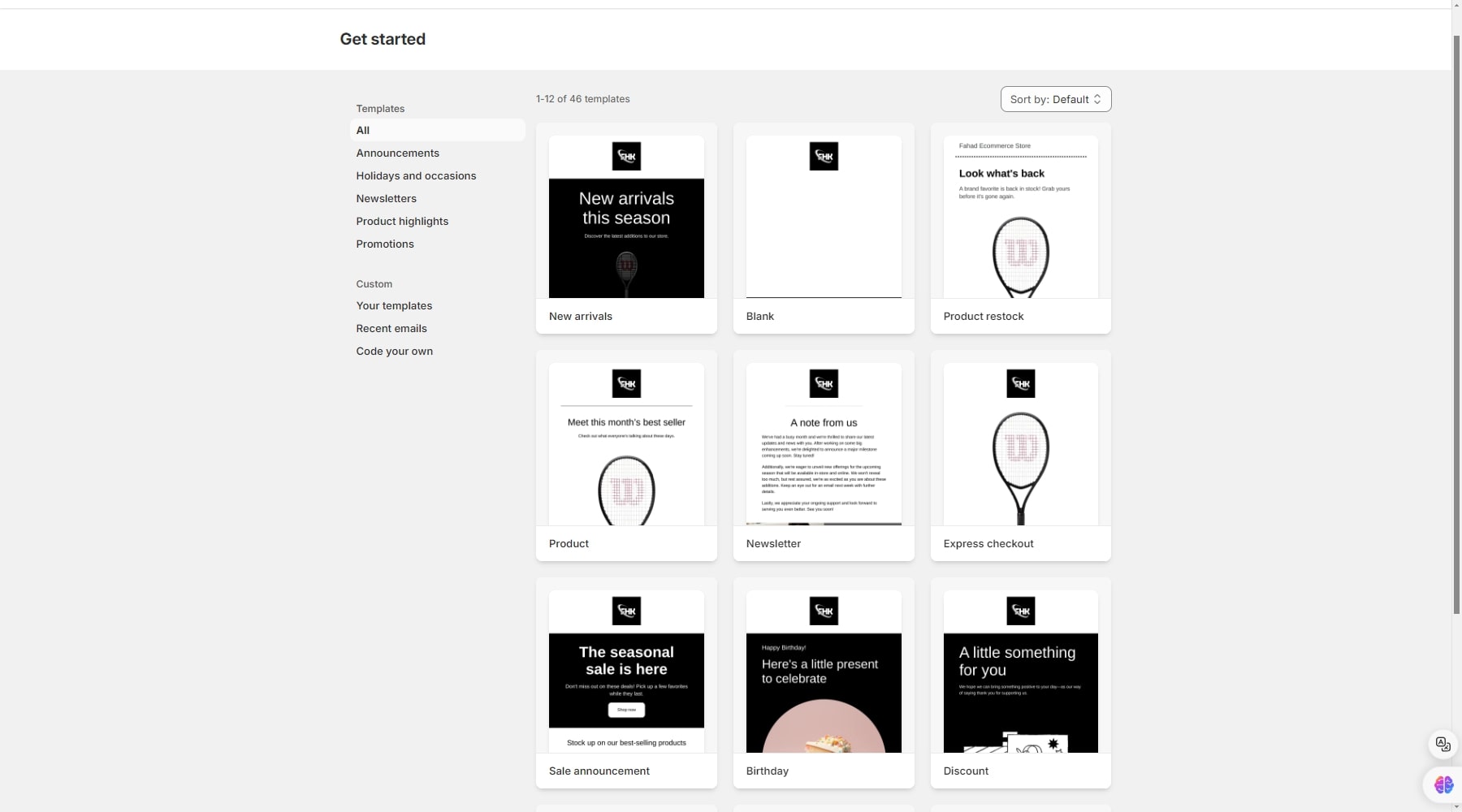
For SEO, Shopify supports on-page optimization with easy-to-use custom title tags and meta description configurations for every product and page. Creating 301 redirects is simple, and if a URL changes, Shopify automatically prompts you. Additionally, Shopify provides a comprehensive SEO checklist via email to help you optimize your site further.
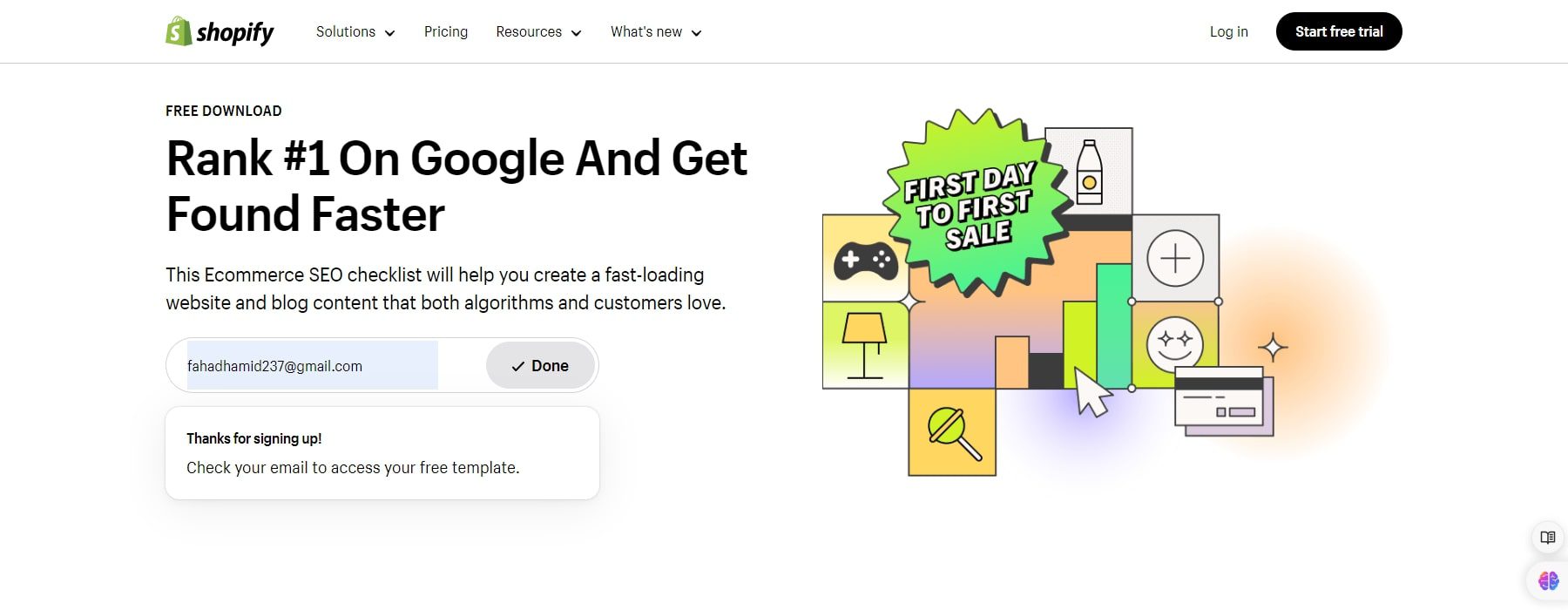
Winner: BigCommerce
BigCommerce offers more robust built-in features to help merchants optimize their sites for search engines. Both BigCommerce and Shopify have built-in blogs for content marketing. Still, the former stands out with its superior SEO tools, such as customizable URLs, title tags, header tags, and automatic 301 redirects. Additionally, BigCommerce includes advanced marketing capabilities like one-click Google Shopping integration and comprehensive reporting tools.
Customer Support and Resources
While BigCommerce and Shopify offer robust customer support and resources, each platform has its strengths and weaknesses regarding accessibility and assistance. Let’s break down the comparison.
BigCommerce Customer Support
When you start a free trial with BigCommerce, they schedule a 10-minute call with you. This helps them learn about your business so that they can give you better advice. If you choose their enterprise-level plan, BigCommerce gives you special treatment.
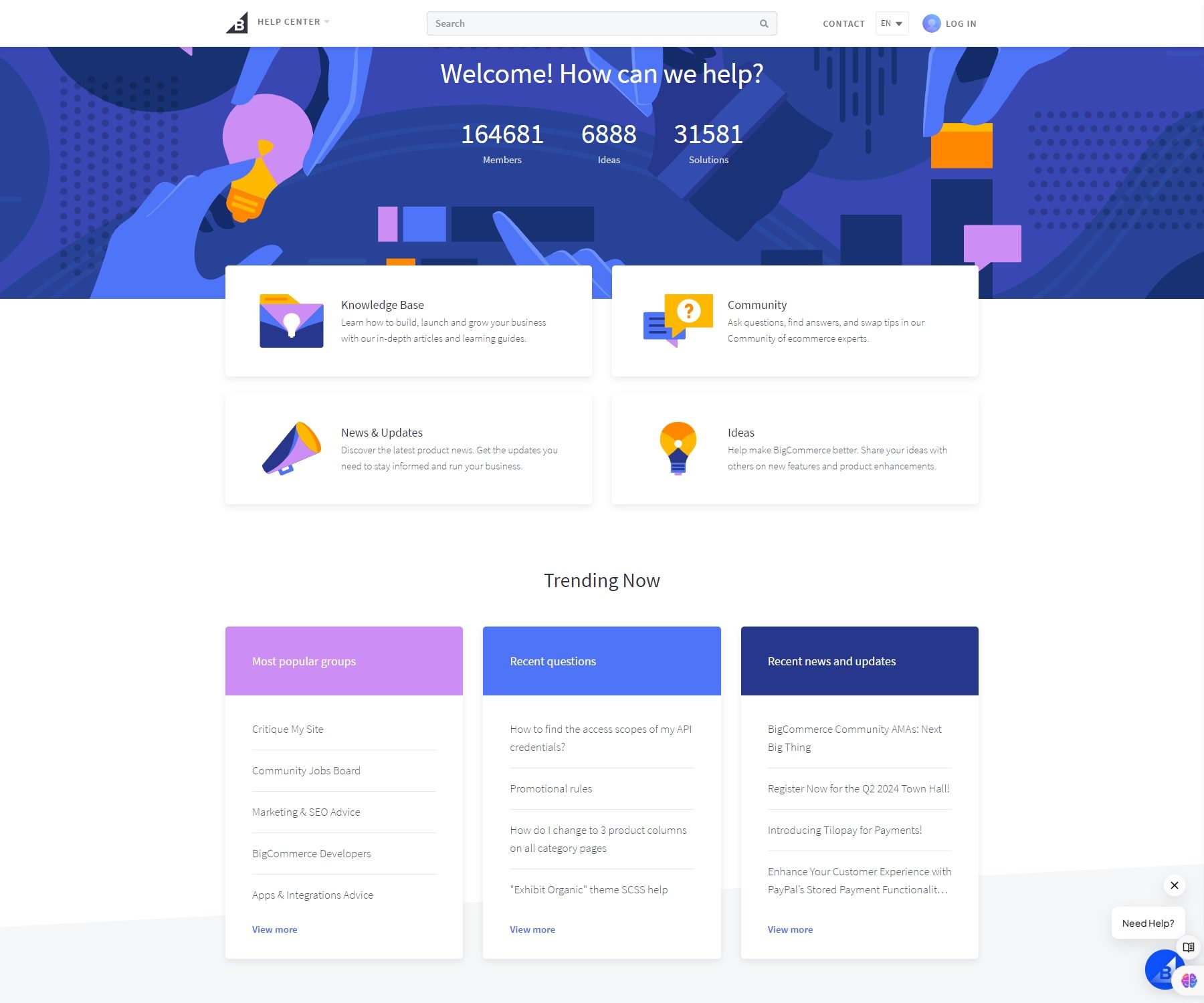
You get access to onboarding consultants who can guide you through the process. Moreover, you will receive phone calls from experienced BigCommerce staff to help you get the most out of their platform.
BigCommerce Resources
Apart from customer support, BigCommerce provides you with the following resources:
- Articles, Guides, and White Papers: This is a comprehensive library of written content that covers a vast array of topics related to eCommerce and using the BigCommerce platform. Articles offer quick tips and solutions, while guides provide in-depth instructions for specific tasks. White papers delve deeper into industry trends and best practices.
- Webinars: BigCommerce offers on-demand and live webinars featuring industry experts and staff. These webinars cover various topics, such as marketing strategies, using specific BigCommerce features, and industry trends. They’re a great way to gain valuable insights and learn from the comfort of your device.
- Podcast: BigCommerce offers a podcast (likely available on platforms like Apple Podcasts or Spotify) that discusses eCommerce trends, success stories, and interviews with industry experts. It’s a convenient way to learn and stay informed while on the go.
- Reports: BigCommerce publishes reports containing industry data and insights on eCommerce trends. These reports can help you understand your target market and make informed decisions about your online store.
- Events: BigCommerce hosts various events throughout the year, both online and in-person. These can be conferences, workshops, or meetups focused on eCommerce and the BigCommerce platform. Events provide valuable networking opportunities and allow you to learn from industry leaders and other BigCommerce users.
- Ecommerce Blog: The BigCommerce blog features informative articles on various eCommerce topics, including marketing strategies, platform updates, and industry news. It’s a great resource for staying up-to-date on the latest trends and best practices in the eCommerce world.
- Developer Blog: This blog is a goldmine for developers working with BigCommerce. It features technical articles, tutorials, and updates on the BigCommerce API and development tools.
- Free Tools: BigCommerce offers various free tools to help you with various aspects of running your online store. These tools might include SEO checkers, shipping calculators, or image optimization tools.
Shopify Customer Support and Resources
Shopify excels in organizing its customer support into detailed sections. Beyond the basic support common to eCommerce platforms, Shopify offers social media assistance. When you seek help within the Shopify editor, it directs you to a relevant page in the Shopify help center. This feature is helpful and gives Shopify an edge over most website builders in this area.
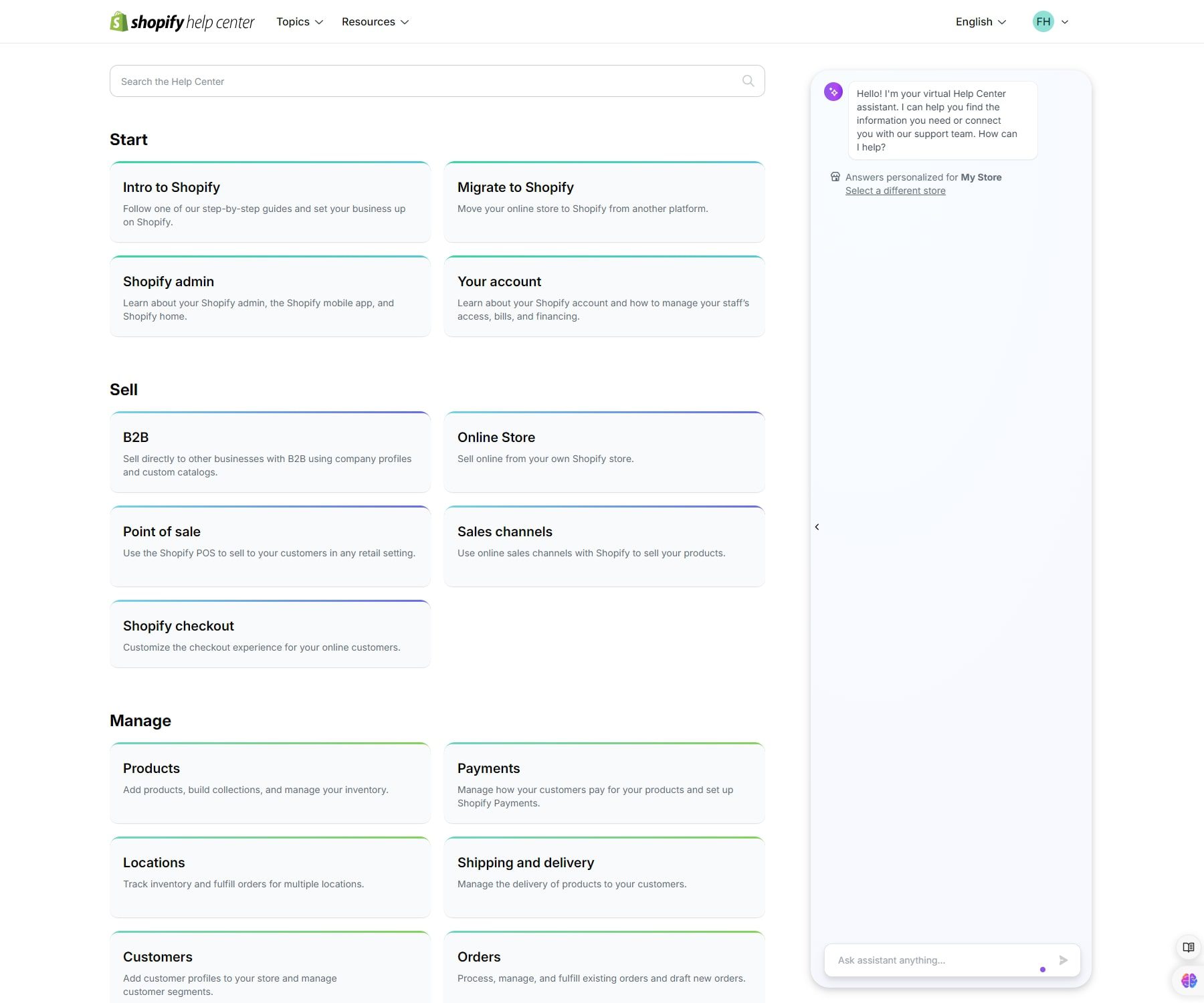
Shopify Resources
Shopify provides you with resources to help you fit in with the platform. Here’s a breakdown of the different resources available:
- Video Tutorials: These instructional videos walk you through specific tasks on the Shopify platform. They’re perfect for visual learners who prefer watching a demonstration to reading instructions.
- Changelog: This records recent updates and changes made to the Shopify platform. It’s helpful to stay informed about new features, bug fixes, and upcoming changes that might impact your store.
- Shopify Community: This online forum lets you connect with other Shopify users, ask questions, and share experiences. It’s a valuable resource for getting help from other store owners who may have faced similar challenges. You can also find experts within the community who can provide more in-depth guidance.
- Business Courses: Shopify Academy offers various business courses to help you grow your online store. These courses cover various topics, from marketing and sales to SEO and fulfillment. They can be a great way to learn new skills and strategies for running a successful eCommerce business.
- Webinars: Free online learning sessions that cover a wide range of Shopify topics. These are a great way to gain new skills and insights from Shopify experts.
Winner: Tied
Both BigCommerce and Shopify have canceled each other out in this aspect. Shopify has a more organized and easy-to-understand help center, which enables customers to resolve their queries instantly. However, BigCommerce offers more resources than Shopify, such as a comprehensive library of articles, guides, white papers, webinars, podcasts, reports, events, and blogs.
BigCommerce vs. Shopify: Which One Is Better?
Shopify and BigCommerce are two of the best eCommerce platforms that allow you to build your online store. Shopify is easier to use and has many different designs from which you can choose. BigCommerce has more advanced tools for businesses that sell in different ways, but it’s a bit harder to use. Both have helpful customer support and teach you how to use them through videos and articles. So, the best one depends on what you need for your store and how much you want to spend.
Overall Winner: Shopify
Shopify is a superior AI website builder due to its competitive pricing, user-friendly platform, and advanced AI tools. With entry-level pricing starting at $25/month, Shopify is more cost-effective for new online stores than BigCommerce’s $39/month. Although BigCommerce offers more design flexibility, Shopify’s intuitive platform supports various online stores, providing numerous free and paid themes that help businesses create professional and engaging storefronts. Additionally, Shopify excels with its advanced tools like Shopify Magic, which optimizes email campaigns, and an AI-enabled image editing tool that simplifies product photo enhancements.
Get Shopify
AI-Powered Alternatives to BigCommerce and Shopify
If you want advanced features beyond basic platforms like BigCommerce and Shopify, WordPress with WooCommerce is an excellent solution. While it may require some initial setup effort, once your store is live, the potential for customization and growth is limitless.

If you opt for WordPress, consider leveraging the Divi Theme for ultimate control over your website’s appearance and functionality. Divi’s intuitive page builder empowers you to design layouts, customize images and text, and even manipulate code directly on the front end without coding skills. Additionally, Divi seamlessly integrates with WooCommerce, a leading eCommerce solution, ensuring a smooth and cohesive online shopping experience for your customers.
Explore our collection of articles that compare various website-building platforms:
Frequently Asked Questions (FAQs)
Before we wrap up, let’s tackle some frequently asked questions about BigCommerce vs Shopify. Is there a question we haven’t answered yet? Feel free to ask below; we’ll give you the necessary information!
Which one is better, Shopify or BigCommerce?
The better platform between Shopify and BigCommerce depends on your specific business needs. Shopify is generally easier to use and offers more themes, making it ideal for beginners and those who prioritize design. BigCommerce, on the other hand, provides more advanced tools for businesses with complex omnichannel needs and doesn’t charge transaction fees, which can save merchants money.
What is the difference between BigCommerce and Shopify?
Shopify and BigCommerce are leading eCommerce platforms, but Shopify is easier to use and has a vast app store for customization. At the same time, BigCommerce offers more built-in features and avoids transaction fees, though it has a steeper learning curve. Consider Shopify for its user-friendliness and scalability and BigCommerce for its built-in functionality and cost-efficiency.
What is the price comparison between BigCommerce and Shopify?
BigCommerce offers three tiers, while Shopify offers four. Shopify starts at a lower monthly cost ($25 vs $39 for BigCommerce). BigCommerce plans tend to include more features out-of-the-box, potentially offsetting the slightly higher base price. Shopify may require additional paid apps to achieve similar functionality.
What sales features do BigCommerce and Shopify offer?
Shopify offers detailed inventory tracking with variant support, history logs, and the ability to adjust stock levels. It also integrates with physical stores through Shopify POS for a unified view. BigCommerce’s inventory management details aren’t as readily available, but it likely offers similar core functionalities. Shopify provides a more integrated experience for managing inventory across online and physical stores. BigCommerce focuses on simplifying multi-channel connections through its Channel Manager.
How do I choose between Shopify and BigCommerce?
Choosing between Shopify and BigCommerce depends on your priorities and business needs. However, you can choose based on transaction fees, customization, conversion rates, inventory management, and multi-channel selling focus.
What is BigCommerce best for?
BigCommerce is best for businesses looking to scale and manage complex omnichannel operations. It excels in offering robust business features like multi-channel selling, advanced SEO tools, and strong integration with popular payment providers. This makes it an ideal choice for growing businesses that need a flexible and powerful eCommerce solution.
What are the benefits of BigCommerce?
BigCommerce offers numerous benefits, including no transaction fees, which can significantly reduce costs. It supports over 65 payment gateways, provides excellent SEO tools, and allows seamless multi-channel selling. Additionally, BigCommerce’s robust inventory management and flexible point-of-sale (POS) system integration make it a powerful choice for businesses of all sizes.
What are the drawbacks of BigCommerce?
BigCommerce has a few drawbacks, including its steeper learning curve compared to Shopify. The platform’s interface, while powerful, can be more challenging for beginners. Additionally, some users find the design options less visually appealing compared to Shopify’s themes, and the higher starting price might be a barrier for new businesses.
What is better than Shopify?
Alternatives to Shopify depend on what features and functionalities you are looking for. BigCommerce is a strong competitor for businesses needing advanced features and lower transaction costs. WooCommerce, integrated with WordPress, offers limitless customization for the more tech-savvy. Other platforms like Squarespace and Wix also provide unique benefits depending on your specific requirements.


